#but i know it had to do with interpersonal relationships with humans
Note
Pokemon crack
Yuichiro finally shows up at blueberry academy
Lan: took your time
Mega: "Lan, don't be rude!"
Yuichiro: hello boys. Lan, is that a school uniform? I thought you didn't like uniforms
Lan: I still don't, but I have to.
Mega: "Lan, behave"
Lan: I'm behaving!
Mega: *sigh* "let's just find the professor and let's get this over with"
At the professor school lab
Prof: it's an honor to meet you Dr. Hikari. I followed your work for a long time
Yuichiro: oh! Really?
Prof: of course! You've done so much in your career, and your research
Yuichiro: well it's always nice to meet people who have the same type of interest in research
Mega: "I thought we were supposed to get this thing over with so he could leave us alone?"
Lan: looks like they're in some kind of deep research discussion. Let's get lunch and hope they're ready after that
Prof: I read your thesis about pokemon behaviors and how humans can better interact with them from front to back! It was so insightful and inspired me!
Yuichiro: Well thank you, that’s very flattering
Prof: I’m so curious though about your relationship with this alpha cofagrigus. Your son is so young and not as experienced as other trainers who own the remaining alphas in the world. And it’s quite intelligent. What’s the deal with it?
Yuichiro: Well, Mega is very special. He was ostracized by his own species as a Yamask and wandered around the region until he met Lan. Saved the kid from an aggressive poochyena. He’s been part of the family ever since!
Prof: But that’s atypical behavior for an alpha! They’re normally very aggressive by nature! How was he ostracized from his own when he’s the biggest and therefore the designated leader of the pack? And to save an unfamiliar child? He should have attacked him along with the poochyena!
Yuichiro: I know it’s hard to believe, but like people, pokemon are capable of personalities that may differ from what is expected. It doesn’t make him any less of an alpha though
Prof: I-I guess I understand…
Yuichiro: Now, my son informs me you want to perform another test on Mega. What would that entail?
Prof: Oh, yes, of course! Well, you see, since he’s a very unusual alpha case—and based on what you’ve told me about him—I was wanting to observe his behaviors and maybe do some scans on him
Yuichiro: Scans? Scan what?
Prof: Well his mind of course. I mean there has to be something wrong with him to have this strange mentality
Yuichiro: There is nothing wrong with Mega. He’s just a docile alpha pokemon, as we’ve discussed
Prof: But as a behavior specialist, even you must admit—
Yuichiro: Mega has gone through a traumatic experience that he does not want or wish anyone that isn’t immediate family to know about. I request you not try to push this, good professor
Prof: Pl-Please don’t be offended Doctor, I only—wait…traumatic experience? As a yamask, or…are you implying he still remembers his past—
Lan: Hey Dad, are you still talking? Me and Mega are ready for—
Yuichiro: Actually we were just finishing up. It was nice to meet you Professor but I must go. Come along, boys, you must show me around the place before I have to leave!
Lan: Uhhh okay???
Mega: ????
They leave
Prof: …Curiouser and curiouser
#anon#responses#mmbn hc land#crack edition#i kinda forgot exactly how i related yuichiro’s job to the pokemon world#but i know it had to do with interpersonal relationships with humans#but i think some psychology and behavioral studies goes along with that too
0 notes
Text
Kabru, impossible mutual understanding & unknowable objects
Despite his concerted and constant efforts to understand other people, it’s established in a few extras that Kabru believes that true mutual understanding between certain different races is impossible. Specifically, between long-lived and short-lived races, and between humans and demi-humans. Partially, we can trace this conviction back to specific hang-ups caused by his life; the trauma of the Utaya disaster, prejudices he carries from his childhood, and his experience of racism among the elves. In this “little” essay, I’m gonna discuss how I think those experiences formed this belief, how it comes out in his actions, and how some of his actions seem to contradict it. The question of whether it’s possible to reach mutual understanding with other living beings despite our differences is one of the core themes of the manga, and I’ll also touch on how this aspect of Kabru’s character links to that.
Seeking understanding
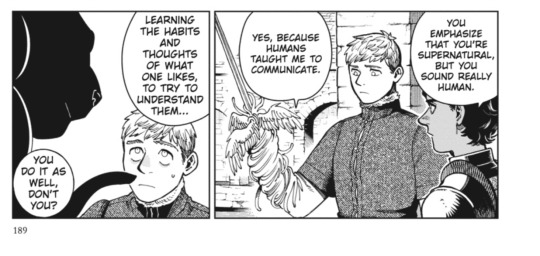
Kabru is a character who devotes a huge amount of time and effort to understanding people, and he is very good at it. In his internal monologue, we can tell how advanced and complex his skills of analysis are. He is able to read a huge amount of information just from looking at people's faces and body language.


People are, to him, what monsters are to Laios. This is something that's been expanded on at length in other, excellent meta. It's the fact that they're foils; it's the fact that Kabru is also very easy to read as autistic, with a special interest which is the opposite and parallel of Laios'. It's something that came out of trauma and alienation, as Laios' special interest in monsters also began as a coping mechanism.
The complicated origin of this "love" for monsters and for people comes through, I think, in the fact that one of the places we see both characters use their fixation is in being very, very good at killing the thing that they love. This also ties into the idea that loving something isn't even remotely mutually exclusive with using it to sustain your own survival; using it for your own purposes; hurting it or killing it. Love can be, and often is, violent, possessive and consumptive. This understanding is part of what makes Kui's depiction of interpersonal relationships so compelling to me.
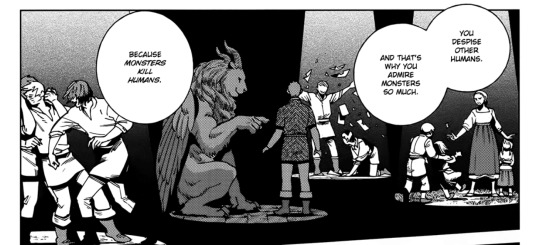
While Laios fixated on monsters and animals to seek a place of escape, in both his imagination and his self-image, from the humans who he couldn't understand and who couldn't understand him, Kabru seems to have fixated on understanding people in order to navigate the complex, socially marginal places that he has been forced into throughout his life. As an illegitimate child raised by a single mother with an appearance that marked him out as different to the point his father's family wanted to kill him, and a tallman child raised among elves who didn't treat him as fully human and wanted him to perform gratefulness for that treatment – treatment that, after he met Rin at age 9, he certainly always understood could be a lot worse – his ability to work out what people wanted from him, whether they were friendly or hostile or had ulterior motives, wasn’t just an interest. It will have been an essential skill.
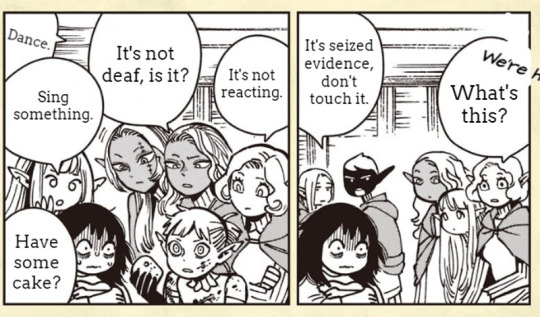
Milsiril, I think, was a flawed parent who tried to do her best by Kabru and did a lot of harm to him despite her best intentions. She may have treated him much better than an average elf would have, but like Otta and Marcille's mother, there are other elves with different outlooks on short-lived races. How would they judge her treatment of him? We don’t have any insight on what it could be, but to be honest, the person’s whose opinion of her I’d be most interested in knowing is Rin’s.
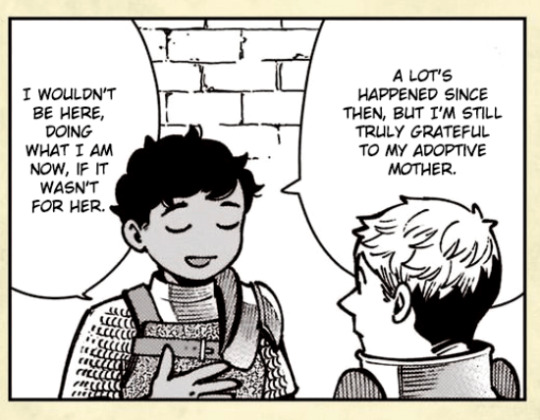
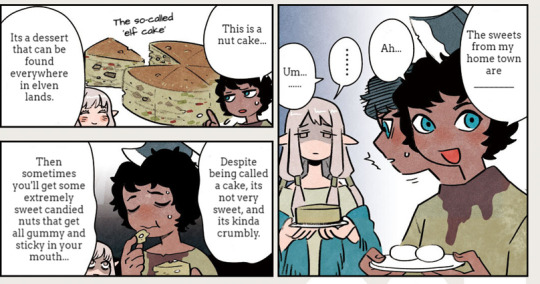
But even if she'd been perfect, living as an trans-racial adoptee in a deeply hierarchical nation with a queen who is a 'staunch traditionalist' who wouldn't even acknowledge the existence of a half-elf like Marcille (according to Cithis) is an experience that would deeply impact anyone.
Elves & Impossible mutual understanding
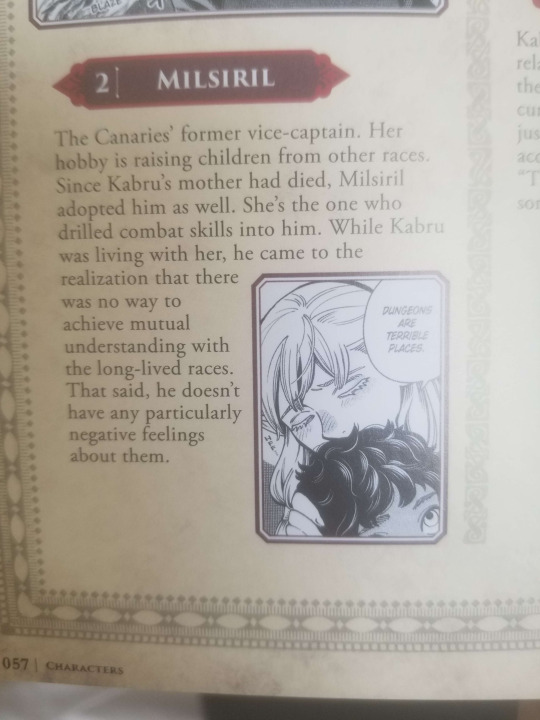
While Kabru was living with Milsiril - in other words, while living in the Northern Central Continent - he came to believe that "there was no way to achieve mutual understanding with the long-lived races."
This is evident in his political project: he wants short-lived races to have ownership over the dungeon's secrets. Despite his dislike of the Lord of the Island, he's a useful bulwark to stop the elves taking over. Despite his doubts about Laios, Laios needs to be the one to defeat the dungeon, because if he doesn't the elves will take over.
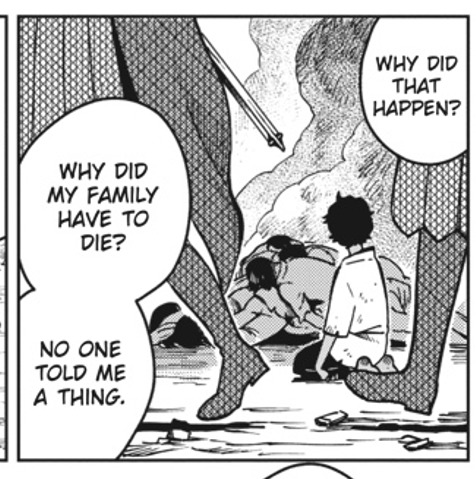
Kabru still carries a deep scar from Utaya, one that was exacerbated by the fact that he never got an answer to any of his questions about what happened or why. This, despite the fact that Milsiril knows about the demon and how it works. Do you think Kabru, with his social perceptiveness that borders on the superhuman, wasn't aware that she knew more than she would tell him?
Given that, the fact that he gets to a place where he "doesn't have any particularly negative feelings about [elves/long-lived species]" .... well, to put it bluntly, I believe that he thinks that's the case, but I kind of doubt it. After all, if he did have resentment, of Milsiril (someone who was his primary provider and caretaker since age six, and who despite her flaws, loves him and who I do think he loves) or of elves (who he has had to play nice with for most of his life, in order to survive, and will still have to play nice with in order to achieve his goals, since they hold all the power) what would that do except hurt him and make his life harder? Kabru is Mr. Pragmatic, so I don't think he'd let himself acknowledge any such feelings he did have. Exactly because he can't acknowledge them, they're well placed to get internalised as beliefs about the Fundamental Unchangeable Nature of the World.
However, these stated beliefs seem to contradict his actions. Despite his belief in the impossibility of forming a mutual understanding, he certainly seems to try to understand long-lived people, just as much as he does short-lived people. There's no noticeable difference between his treatment of Daya & Holm versus Mickbell & Rin that isn't clearly down to their relationship with him. His skills of human analysis were honed and developed while living amongst elves, and as soon as he's alone with Mithrun he immediately sets to understanding him - his interests, his motivations, his needs, and his past.
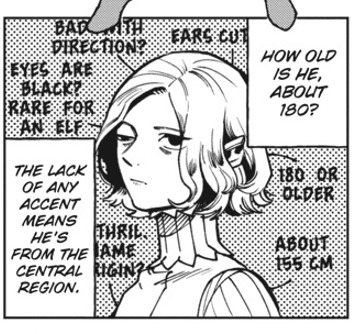
He treats him considerately and without bias, and despite the fact that Mithrun conquering the dungeon for the elves is both a reenactment of a core part of his childhood trauma and a political disaster for his aims, that doesn't seem to colour his perspective on Mithrun negatively at all.
This is something I find extremely laudable about Kabru, and it's another way he parallels Laios. He seems to understand that people, as a rule, (in Laios' case, he understands this about monsters - and eventually, all living beings) will act in their own interests, and if those interests conflict with yours, might harm you. But that's just their nature, and it's not something that should be held against them; you're also doing the same thing, after all. The crux of Laios' arc is precisely that he has to accept the responsibility of hurting someone else in order to achieve what he wants.
Kabru is deeply concerned with his own morals, what he should and shouldn't do, but mostly in the context of responsibility for the consequences - a responsibility he takes onto himself. He isn't scrupulous about what he needs to do in order to create the outcome he wants, but if he fails to create that outcome, then....
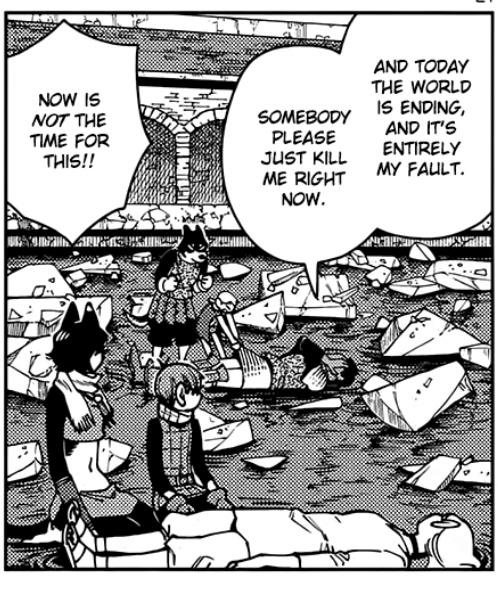
He blames himself to the point of thinking he should die. He doesn't blame Laios, or seem at all angry with him, despite concluding he should have killed him to prevent this outcome. That's because in his eyes, ultimately Laios was going to act according to his own nature, and it's Kabru's fault for not understanding that nature well enough. He's extremely confident in his ability to understand and predict others, (including elves and other long-lived people). Then, where does his conviction that mutual understanding is impossible come from?
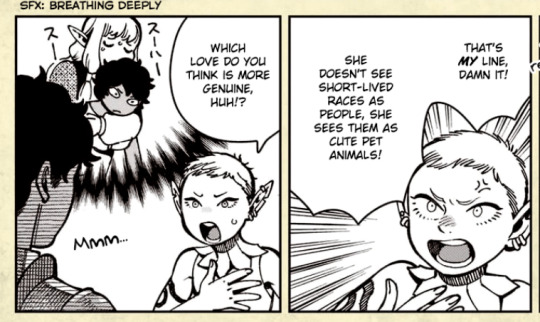
Partially, it's the "mutual" part. I'm sure Kabru, who isn't able or willing to deny Otta's insinuation that Milsiril saw him more like a pet than a son, has felt that his full interiority, the depth of his feelings and his ability to grow, act, and think as a fully equal being, was something that the elves around him just couldn't grasp. Because that was their excuse for it, he came to understand this as a gulf between short-lived and long-lived beings, an inevitable difference in outlook caused by their different lifespans.
This experience might be part of what leads to his iconic “fake” behaviour. He trusts his ability to understand others, but if they aren’t able to understand him, then there isn’t any benefit to being honest about his feelings and thoughts. If his attempts to reach mutual understanding with his caretakers were never able to be fulfilled, then it isn’t any wonder that he reacts with such surprise and horror at blurting out his desire to be Laios’ friend.
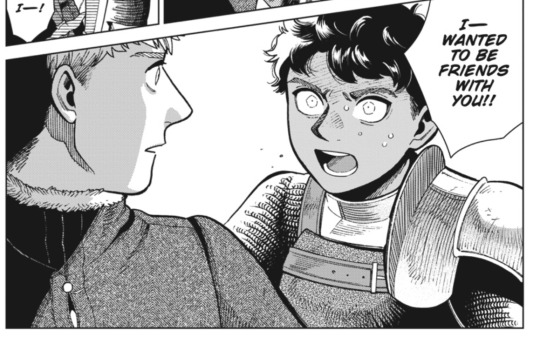
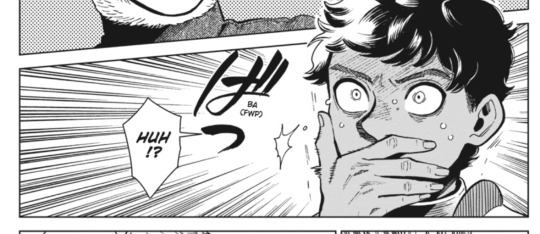
In his experience, making yourself vulnerable in that way only leads to being hurt. Soothing him, hushing him, lying to him, talking to him like a child that isn’t able to use proper judgement – that’s an inadequate and deeply hurtful way to respond to genuine distress, the desire for autonomy, or disagreement. Ultimately, I think that’s why he comes out on the side of being grateful to Milsiril; because she did equip him with the skills and knowledge he’d need to reach his goal, and let him go.
Though he could understand them, they couldn't understand him. To the extent that was true - which I'm sure it was - it wasn't due to anything about lifespan. It was due to the elves’ racism, and the solipsitic mindset & prejudiced attitude that it caused them to approach him with.
Because, if it needs to be said, the idea that there is an unbreachable gap in understanding between the long-lived and short-lived species is not true. Marcille and Laios have a much greater difference in lifespan than any full elf from any short-lived person, and they’re able to understand each other – maybe not perfectly, but better than many other people who are closer in life-span to them.
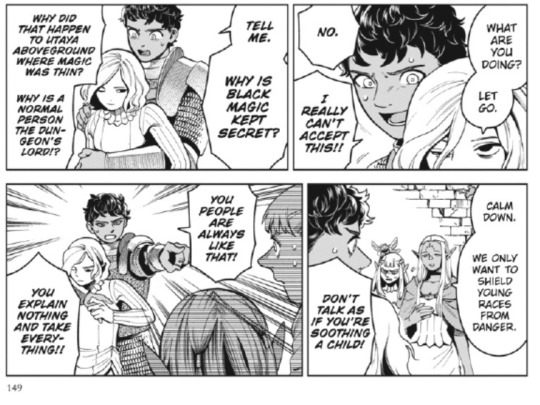
That doesn’t mean that I think Kabru is wrong about this, however. Because there’s an interpretation of his statement that is reflected in his actions and is true. When he talks about his problem with elves, it’s not just their attitudes: it’s their power, and what they use it to do. They “explain nothing and take everything”. Though it’s presented in the guise of ‘guiding and protecting’, in fact it’s a simple case of a powerful nation using their military power, wealth, access to resources, and historically stolen land – including the island itself – to protect their own interests and advance their own agenda. That’s why they’d be able to show up, seize the dungeon, and forcibly take Kabru’s party and Laios’ party to the West. If Kabru wants to stop that from happening, or change that status quo, persuasion or a bid to be understood would be completely pointless. Between the political blocs formed by long-lived species and the interests of short-lived species, “mutual understanding”, given their current, unequal terms, would be impossible. This is something that we see reflected in Kabru’s actions; before he asks his questions about the dungeon, he grabs Mithrun as leverage. He never really attempts to persuade the canaries to see his point of view, because that would be pointless: they’re agents of the Northern Central Continent’s monarchy, and will act in its interests regardless of any individual relationship with him.
I don’t think Kabru sees the different dimensions of this belief of his in quite such clear terms, however, as is evidenced by the other group who he thinks it’s impossible to communicate with.
Demi-Humans & Unknowable Objects
The other place that we see his conviction about the impossibility of mutual understanding is in the kobold extra.
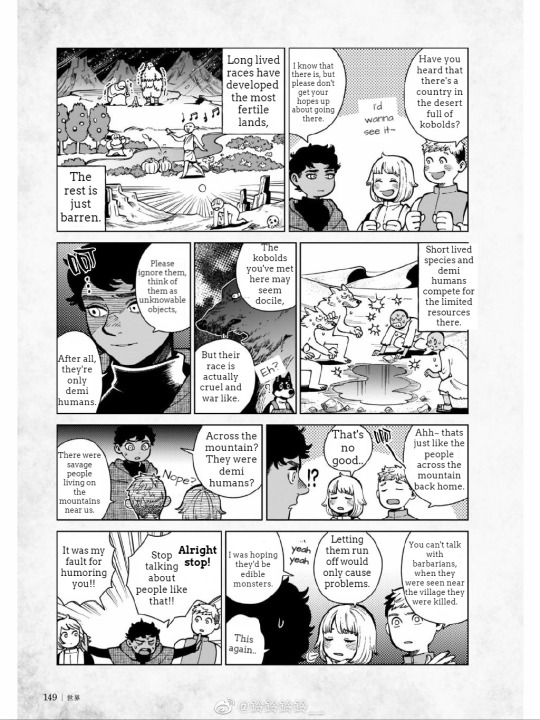
I'm including the whole thing, because I think it's an excellent and clever piece of world-building. Aside from what it says about Kabru, which I'll expand on shortly, what this extra does is deconstruct and call into question the usual "fantasy ontological biology" present in these sort of DnD-like settings. Essentially, the kind of worldbuilding where a race (such as kobolds) can be described as war-like, and that's establishing something essential about their biological nature. That's common to the point that if Kui didn't include this, some people would probably come away thinking that's the case about, e.g., the orcs.
But here, despite what Kabru is saying, the information the reader actually gets is:
the conflict between short-lived humans and demi-humans such as kobolds is mostly over access to material resources that they need to survive.
These resources are scarce because powerful nations, such as the elves, have monopolised them.
Kabru, who has grown up in a place at the centre of these conflicts, ascribes essential, negative traits to a cultural group which was in direct conflict with his own. Communication with this other group is impossible; they aren't people, they're more like objects.
oh yes! just like this conflict between groups of tall-men, a conflict which the reader will immediately interpret as more clearly analogous to real-life racism. Our other protagonists also carry prejudices from growing up in a place where a marginalised group was in conflict with the dominant group over scarce resources. It's definitely impossible to communicate with these people, and you can only kill them.
Woah, when you say it like that, it sounds pretty bad!
But also, nobody walks away having had a realisation or unlearned their prejudices - because they don't have the tools they need to do that work. Yet. I do think, to an extent, it could happen - especially with Kabru, since it's suggested in the epilogue that Melini might become a safe-haven for demi-humans.

To focus in on Kabru, the key here is his statement that you should think of demi-humans as "unknowable objects". Even his extraordinary powers of understanding have seemingly hit a limit. Part of this is just inherited prejudice, and doesn't need to have a complicated psychological explanation, any more than the elves who were prejudiced against him need one.
But also... this is probably somewhat linked to the way demi-humans seem to be considered "pseudo-monsters". They're the place that the strict delineation between the human and the monstrous is permeated. Laios, who is not interested in humans, remembers and is excited by Kuro. Chilchuck and Laios argue over whether it's OK to eat a mermaid. Kabru's prepared to (pretend to) roll with the idea that Laios ate the orcs.
But these are people, aren't they? Of course, this is a social construction, as we see from the fact that in the Eastern Archipelago, the label of "human" is reserved for tallmen, but in most of the rest of the world it depends on some obviously arbirary classification based on number of bones; "demi-humans" aren't in any essential way monstrous, except to an extent in their appearance, and physical location - due to their marginal social status, they're pushed out to live in unsafe places such as dungeons.
Therefore, Kabru's view of demi-humans as fundamentally "other", unable to be understood - monstrous - could be read as akin to abjection, the psychoanalytical concept described by Julia Kristeva. In order to create a bounded, secure superego, that thing which permeates and calls into question the border between self and other, human and animal, life and death, is rejected and pushed to the margin.
“Not me. Not that. But not nothing, either. A "something" that I do not recognize as a thing.[...] On the edge of nonexistence and hallucination, of a reality that, if I acknowledge it, annihilates me. There, abject and abjection are my safeguards. The primers of my culture.” (Kristeva et al., 1984, p. 11)
“It is thus not lack of cleanliness or health that causes abjection but what disturbs identity, system, order. ” (Kristeva et al., 1984, p. 13)
“The pure will be that which conforms to an established taxonomy; the impure, that which unsettles it, establishes intermixture and disorder. [...] the impure will be those that do not confine themselves to one element but point to admixture and confusion.” (Kristeva et al., 1984, p. 107) (discussing food prohibitions in Leviticus)
This is both (due to its affinity with food-loathing and disgust) a very fruitful concept to apply to dunmeshi, and a psychoanalytical theory which I wouldn't exactly cosign as True Facts About Human Psychological Development. You may also know the abject from its utilisation in the classic essay "Horror and the Monstrous-Feminine" by Barbara Creed - that's a lot more approachable than Kristeva if anyone's interested.
Key here, though, is that through the symbol of the "demi-human" is embodied a step between "human" and "monster" - and that's a prospect that puts at risk the whole notion of an absolute separation between those two categories in the first place. To Laios, that's something wonderful, and to Kabru, it's terrifying. We can see this principle further embodied in the relationship both characters have with the notion of becoming monstrous.
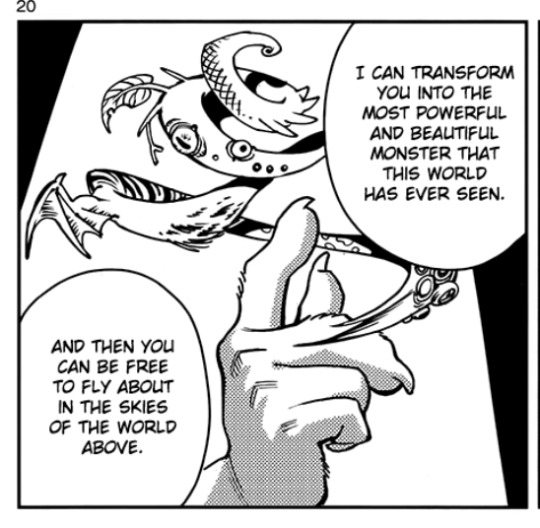
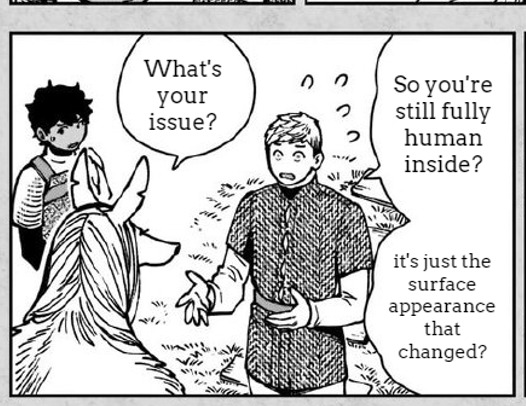
To Laios, this is transcendent, and represents a renunciation of everything human - in fact, if it didn't, it wouldn't "count".
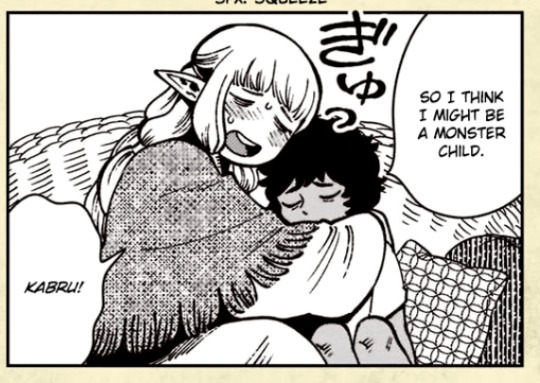
To Kabru, it's a deeply-held fear, established by his childhood alienation (due to his illegitimacy, his eyes, and perhaps also his neurodivergency), deepened by monster-related trauma and the sense of responsibility and survivors guilt he feels for what happened at Utaya. His identity as a human who is not monstrous is key to his sense of stability and safety; he doesn't want to touch monsters, he doesn't even want to see them.
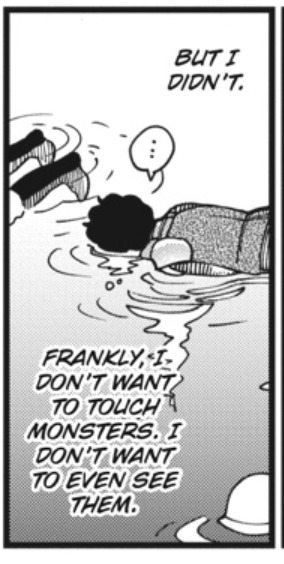
To acknowledge a kinship, a possibility of similarity between the things he loves (humans) and the things he hates (monsters) would be more than touching them - it would be putting them inside him. We know, quite explicitly, that this notion is triggering to Kabru. He literally has what seems to be a flashback when he's about to eat the harpy omelette.
So he abjects it, classifying the demi-human as fundamentally unlike him - an unknowable object, or an object that he refuses to know. Because in understanding it, he would interject the things he hates and fears into his self, which is already, always under threat by that hated and feared object.
Of course, again, Kabru isn't very good at enacting this refusal in practice. For one, when he chooses between his desires and ingesting the feared object, eating monsters... he eats monsters. Part of this is treating himself badly, the "ends justify the means" mentality. His goal is to destroy all monsters, so if he needs to become monster-like to do that, he will. But part of it is also the other motivation that he didn't even seem to know about until he said it: he wants to become Laios' friend, and to learn from him how a person can like monsters. He wants, at least in some part of him, to reconcile the feared and hated object into something he can understand.
For another:
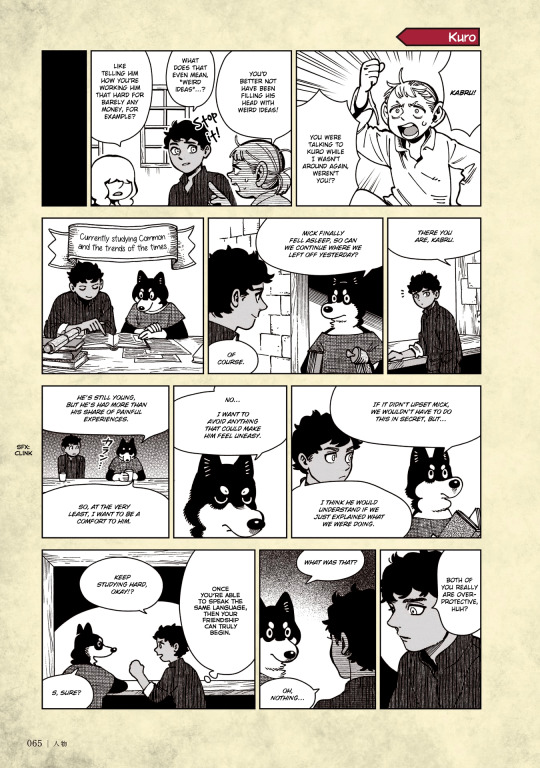
Kabru can speak the kobold language. In the first place, while this may have been common in Utaya, it also could have been something he chose to learn, an early expression of his interest in understanding and talking to all sorts of people. It isn't the kind of thing you learn if you believe that communication between yourself and the group that speak it is impossible, is it?
It's possible to harbour prejudices against a group while being kind to an individual, and given Kabru has those prejudices regardless of his reasons, that is what he is doing. But also, his treatment of Kuro doesn't reflect a sincerely held belief that he's an "unknowable object" at all. His approach is exactly the same as it is to any other person: an analysis of goal and motive, and an attempt to help if he's sympathetic and their goals align - going out of his way to give language and local knowledge lessons in secret. His conviction that Mickbell and Kuro will truly become friends when they can properly communicate is completely contradictory to any sense of demi-humans as fundamentally different, or impossible to reach mutual understanding with. To me, it seems like this self-protective shield against the corruptive force demi-humans as an idea present to his identity, this abjection, when Kabru is face-to-face with one, just simply can't hold up against his finely honed skill of intellectual empathy. Perhaps because he's autistic, it seems his "empathy" is less an emotional mirror response, and more a set of cognitive skills for analysis of others. That instinctual, emotional empathy might not trigger when presented with a member of an out-group, but if it’s possible for Kabru to turn his cognitive empathy off, we don’t see him do it.
This isn't to say that this prejudice doesn't affect his behaviour. For one, it could negatively impact his judgement of politics and policy, where individual people don't enter into it. For another, I'm not convinced he'd be willing to overlook Mickbell's exploitative relationship with Kuro if Kuro wasn't a kobold. As it is, since both of them are satisfied, he doesn't feel like he needs to intervene, regardless of the fact Mickbell isn't paying Kuro. But if Daya and Holm were in a relationship, and Holm took both Daya's and his own share from their ventures, but only compensated her in living expenses and kept the rest, do you think he'd tolerate it, for example? Even if she said it was OK?
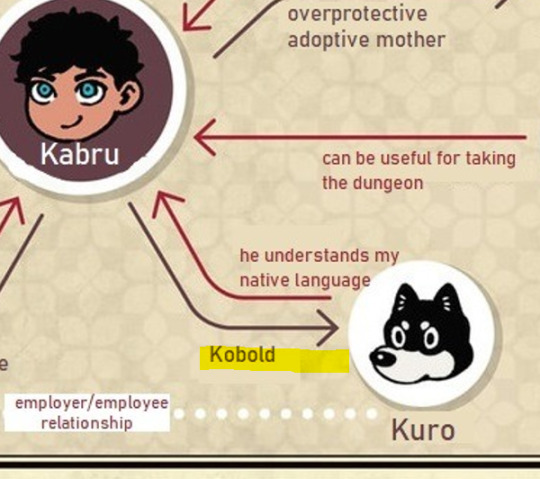
Conclusion

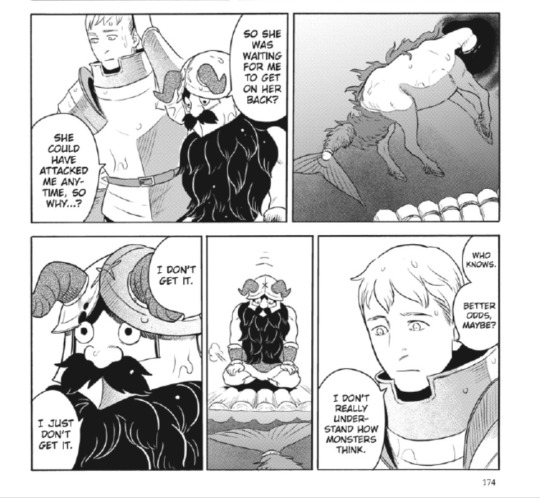
The kelpie chapter establishes that "people can never know what monsters are really thinking." That isn't just true of monsters, though.
True mutual understanding is impossible - between anyone. We can never truly understand another person's heart. This is touched on in, for example, the existence of shapeshifters and dopplegangers. Even a monster that seemed like a perfect copy of a person wouldn’t be that person, and wouldn’t be a satisfactory replacement.
We’re intended, I think, to understand the winged lion's repeated suggestions to just replace people who have been lost with copies as something uncanny, which demonstrates the way that the winged lion never manages to attain a complete understanding of humans. A version of a person who was created to fulfil your memories of them, to be the person who you wanted them to be, would be a terrible, miserable thing.
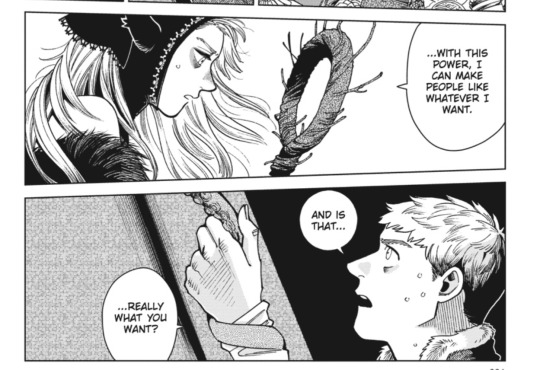
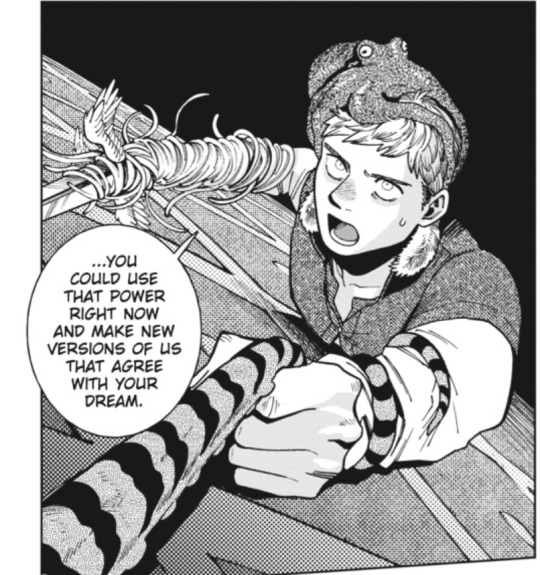

Disagreeing, coming into conflict, and misunderstanding each other, are essential parts of what it means to be living beings, as fundamental as the need to eat.
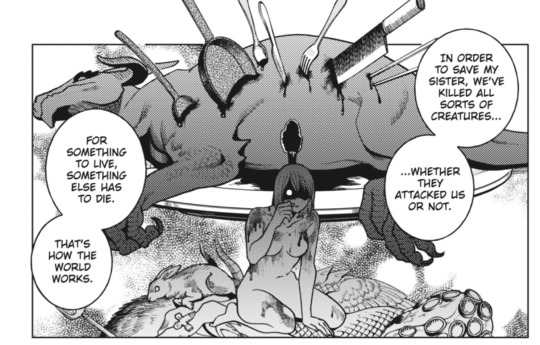
The only thing to do is not to take more than you need to eat to survive, and not impose your own desires onto others. To do your best to sincerely communicate your desires, even if they're embarrassing or vulnerable or strange, like Kabru eventually does with Laios; like Laios does, bit by bit, with the people around him; like Marcille does, Chilchuck does, Senshi does... to hope they will accept you, and do your best to understand them in return.
We can re-examine, in that context, Kabru's line about the elves' tendency to "explain nothing and take everything".
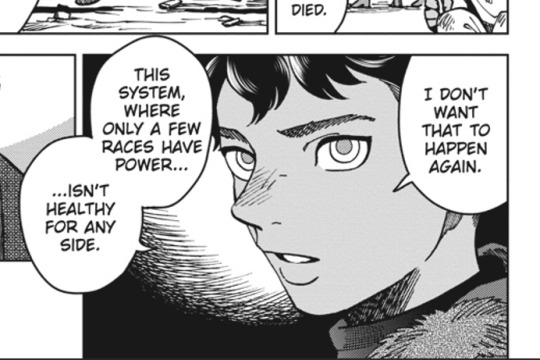
They have the power to impose their preferred "menu" onto less powerful groups. And in that context, mutual understanding being impossible just means that they won't give up their power because they're asked nicely. Kabru's goal is to seize the truth that they won't give to him, and to create a situation where they can't take everything. Because he's accurately surmised that nothing about the treatment of short-lived races will change so long as the power imbalance remains. Despite the way he mistakenly ascribes part of that to "long-lived vs short-lived" or "human vs demi-human", the actual gulfs in understanding he identifies are structural, are about power and about access to material resources and safety.
I think he could come to recognise this. Yaad is teaching him political science after all, and while a prince's lessons on political science won't exactly get at much that's radical or invested in the interests and perspectives of the marginalised (Capital is a critique of for a reason after all...) I believe in Kabru's ability to learn critically and get more from a lesson than it was intended to teach.
#og post#kabru of utaya#kabru dungeon meshi#laios touden#dungeon meshi meta#dungeon meshi#dunmeshi#dungeon meshi manga spoilers#dungeon meshi analysis#kuro dungeon meshi#the canaries#milsiril#continuing to develop my kabru theses.#literally sitting and thinking about kabru all day. rotating him.#he's in the microwave. to me.
386 notes
·
View notes
Text
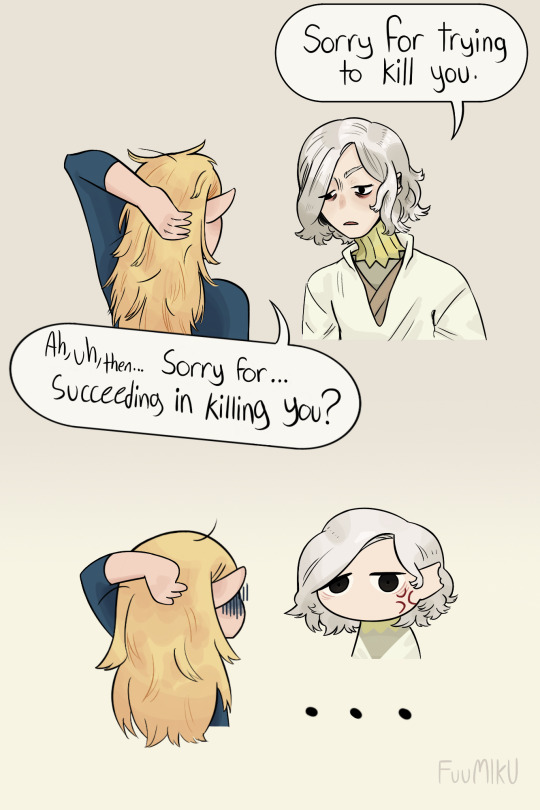
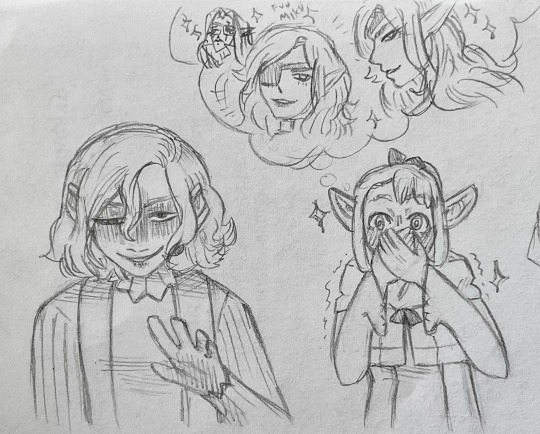
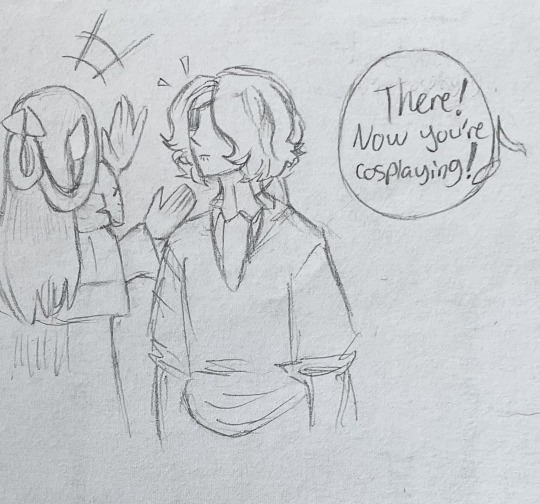

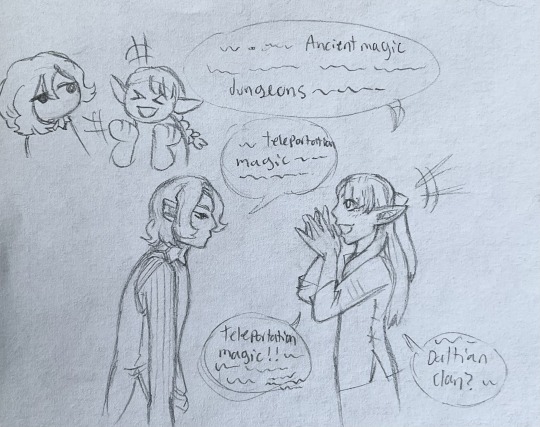
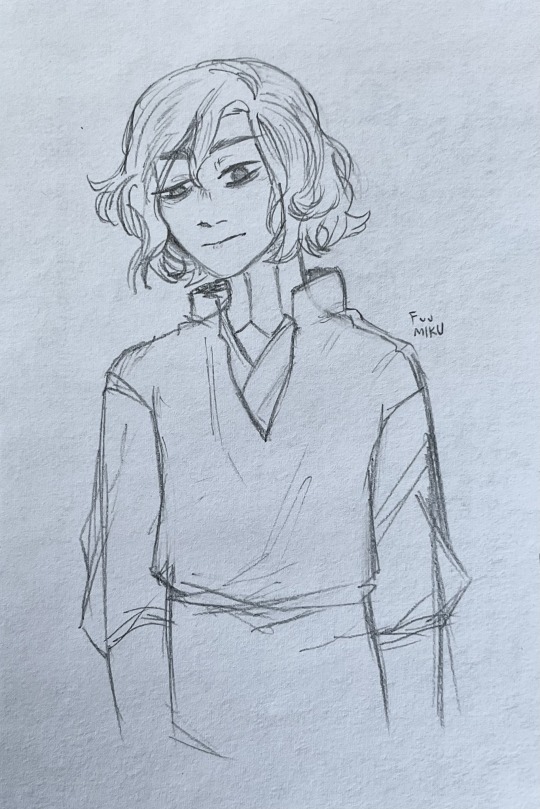

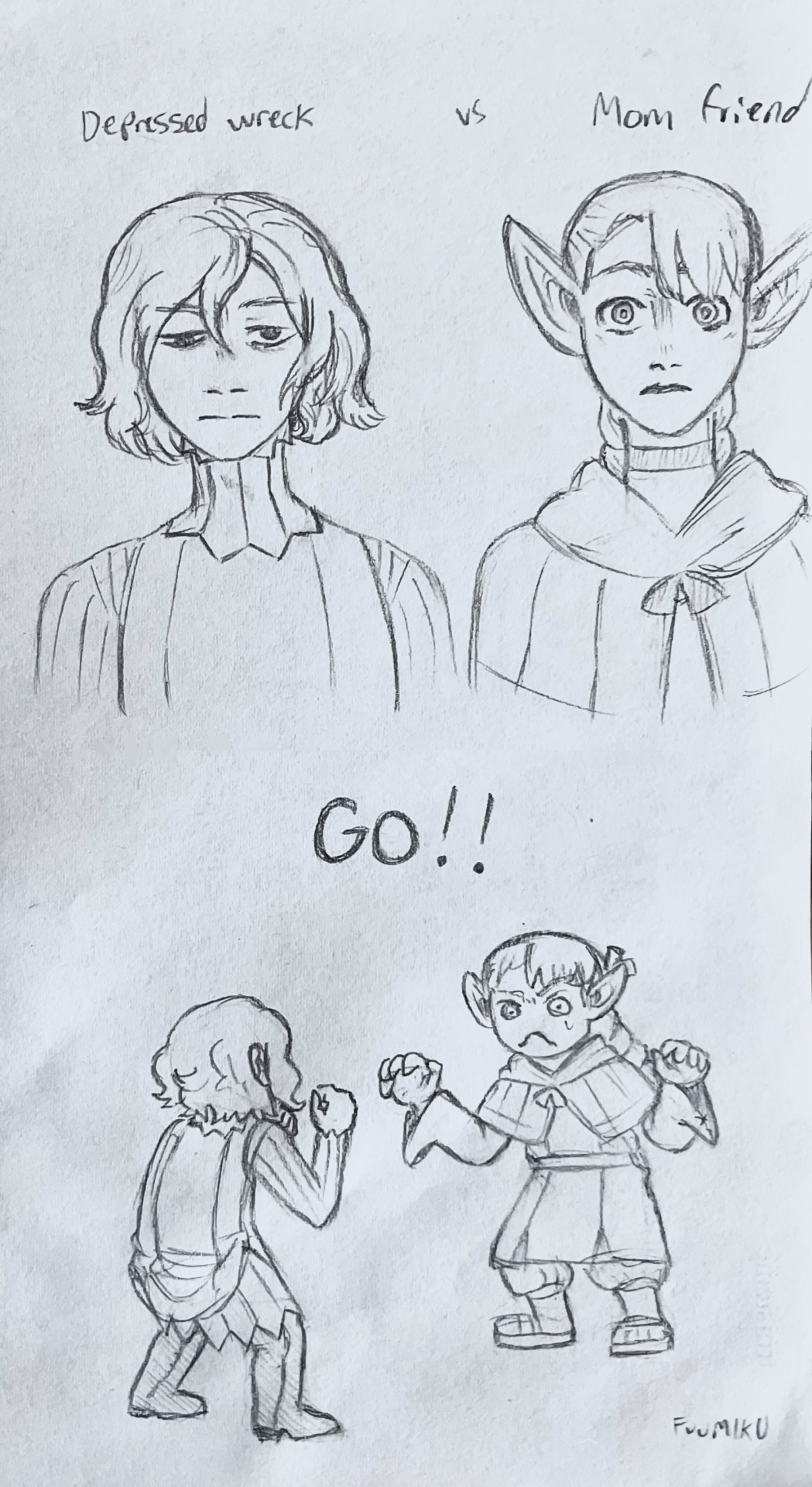
They’re really interesting foils in many ways. I’ve always thought that Marcille & Mithrun have underrated dynamic potential. Give me the cringefail dungeon lords. Give me the elves with ears-centric metaphorical self-image issues. Give me the academic elites whose deepest strongest desires will always remain unreachable and the only option is to turn to the corrupt forbidden fruit of a demon pact. I am so so normal about Mithrun and Marcille
I wonder if the resemblance between captain Mithrun and general Hagreus aka Marcille’s fave in Dalclan is intentional… They definitely look very alike. It could represent idealization vs reality? Something something the romanticization of elves and their societal drama in their fiction vs a very real and imperfect product of their military system. The canaries certainly aren’t glamorous next to whatever Hagreus is the general of.
I feel like she never had the opportunity to notice the resemblance herself bc within seconds of meeting him he was wrestling her on the ground but. If she had… She would so think he should have been his actor in the tallman stage play of Daltian Clan in that new extra comic hehe. I love the little details like Hagreus’ lips being drawn with extra details because they’re full and pretty while Mithrun’s lips are drawn with extra details because they’re chapped lmao.
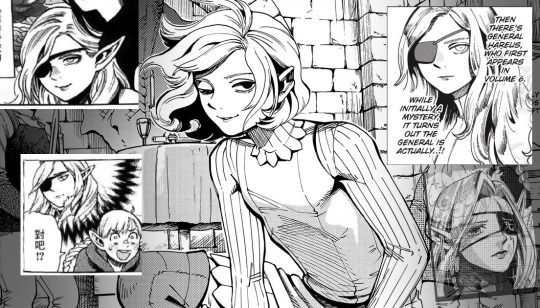
This art is all silly and surface level but in my head mithrille is like so dramatic and I make up daltian clan level big plots with them gbdgd.
I made a spotify playlist for mithrun if y’all interested, rn it’s mostly centered around cravings that consume and losing yourself and illusions inspired from his time as dungeon lord but it’s branching out. Varied vibes, levels of intensity and degrees of confusion and await you ✨ I would emotionally rant about Chainsaw Man ost lyrics and how they tie in with Mithrun and the winged lion’s relationship but this post is already a monster
I want more of these two please please please pleaseee just one or two interactions in the new canon content coming up… All they ever did was debate philosophy on desires and human self-fulfillment and try to murder each other, please…
I never get to gush about them and I can’t shut up so if you want more thoughts I talk about them more below
To get a girl to peacefully accept arrest follow these simple steps: in private, ominously stand above her and forcefully interrogate her, while in public, tell her you’ve met before (untrue and also not a pickup line, you’re just face blind) and interrogate her with a thin veneer of decorum. If all else fails, threaten and follow through on said threat. My guy needs more than just physical therapy I’m afraid
Sorry if most of these were Marcille-centric with Mithrun standing there looking cool, if I were doing these more from Mithrun’s pov things would be like "She’s a bit much but I guess I don’t mind hanging around her." or "Oh you’re a half-elf? -insert elven supremacist rethoric-" or "I have to keep her from becoming demon stew." immediately followed by "Did someone say demon? Kill kill kill kill kill" since these are set prior to like really knowing another. Then things would be more like "huh she has bad tastes in novels but her magic research is pretty interesting" and "I’m lonely and don’t understand myself— Oh she loves talking about feelings? Oh shi-"
That last one is an aspect of why I like Marcille and Mithrun’s potential dynamic lol. She’s very… Emotionally intelligent alongside being impulsive. You think you have no feelings because the world has beaten them out of you? Think again!! Marcille be upon ye! -In a therapy sort of way but mostly in a connecting with people and your own self through interpersonal relationships and talking kinda way. I just think a lively, upbeat, annoying friend way too interested in your personal life would do him good, the canaries are nice but like if Marcille went to prison and was a sort of extra new bunkmate I think that’d be interesting and fun to read is what I’m saying
Unlike Kabru she wants all the useless messy filler of his backstory, eating chips while listening. Like two chibi sets side by side, "me and my fellow canaries, name name and name-" "Hold on we don’t need to know that." Vs "Then we were to sleep on the third floor of the dungeon, which had the look of a mausoleum, and name and name got into a fight over the campfire placement." while Marcille is like uh-huh what next what next while kicking her feet. She thinks of pre-dungeon pompous Mithrun and is like omg you went through a character arc and become better as a person- and then he opens his mouth and she’s like nevermind let’s keep working on that. She would also go "ew ur hair is greasy" and give him a full hair care treatment. What I’m saying is I need them to be forced to spend time in a dungeon together and become besties through a life or death roadtrip
Marcille is insecure about her ears, long, like an elf’s pride should be, but rounder, inelegant. Seeing Mithrun though, the epitome of beauty, with his half-cut ears make it a sillier thought.
Not sure if Mithrun is the best person to reconnect with ur elven culture with but it sure is an option
Marcille would so appreciate being around someone both cool headed and kind, I genuinely think they’d get along, like not that Senshi isn’t that too most of the time but I think Mithrun would be in a way that’s more refreshing to her.
I’d be so curious about them discussing Dalclan, I doubt he’d have read it but she could make him read it, maybe post-canon with the excuse that they’re trying to find him a new hobby hah. He’d tear into the writing and everything but it’d be a fun time, I like to think that it’d make him a bit less prejudiced. Marcille @ Mithrun "👉👈 Soo maybe you don’t know these books they’re pretty recent having come out 50 years ago but…"
I’ve been in a Mithrun phase I want to make and read Mithrun-centric fics and angst so baaad. I razz him a lot here but he’s literally a traumatized military man that became obsessed with revenge due to bad coping and neglects himself in the process idk not much for him going on and some of it is because he has to work on himself, but hey no one’s perfect it all comes from a place of love and relating though I prommy. He’s the one ungodly angsty squeaky toy blorbo with brain damage rep I have don’t take him from me
#Dungeon meshi#mithrun#marcille donato#I feel like i haven’t drawn in so long i’m so rusty#Mithrille#Mithrun x marcille#Marcille x mithrun#I finally did smth for these 2 yippee#Dust and dog hairs manage to get on my drawings while i take pics it drives me mad i can’t do this anymore sorry if you see any#Continuation of my Marcille: “LET ME LOVE YOU!!” saga#Sorry marcille i hate drawing your sleeves#There are a couple things I’m not satisfied with and might redraw at one point but i need to stop and get stuff done#Marcille has 5 cm of height on mithrun according to the adventurers bible neat#Spoilers#dungeon meshi manga spoilers#I’ll move those last two tags up when I get to my computer#Character playlist#I made a more formal mithrille post on another blog explaining what potential i saw in them just search in the ship tag if you’re intereste
162 notes
·
View notes
Text
This post is going to cause controversy here on radblr. I already know that, and I'm ready for it. But there is something that I've just got to get off my chest, here. It's been bugging me for a long time now, but for the longest time, I couldn't quite find the words to describe my feelings.
Here's the thing. It's not that female separatists are wrong, necessarily, with regard to their arguments about male violence. OSA women like myself are at a greater risk of interpersonal violence from men, intimate partner violence does make up the majority of domestic violence statistics, men are the most likely people to rape or murder us, and yes, living without men therefore probably would improve straight and bisexual women's lifespan/overall quality of life in most cases. BUT. The way many female separatists (who are most often lesbians) go about presenting their arguments is not only unnecessarily rude to women who have done nothing to deliberately harm them (and, when it includes such colorful monikers as "dick worshipper" and "cock rider" in it, reasonably comes off as an attack), but it includes many of the same tactics that homophobes use against LGB people to make their point. I'm sure that homophobes doing that stuff to you is hurtful, but I'm also at least 99% sure that heterosexual women who are radfems (or rad-adjacent, if you prefer) aren't the ones leveling those attacks, and don't therefore deserve to be responded to with such ferocity. Two wrongs do not, in this case, make a right. And it needs to stop.
For example, you ask?
Acting like heterosexual relationships must be purely sexual, with no actual love involved whatsoever.
I see LGB people complaining about homophobes doing this to them all the time. "You think our relationships inherently obscene or kinky because you can't picture us actually being in love; all you can think of is the sexual part! You think a sizable chunk of the population is incapable of love or human connection, and that is dehumanizing!" Yes, I have no doubt in my mind that it is. But then look at what you do when you try to call out heterosexual/bisexual women for being with men, and you are doing exactly the same thing to us. You talk about OSA relationships, and the first and, often, only thing you ever bring up is the sexual aspect of them. The word "love" almost never comes up. It's like it doesn't even occur to you that OSA women might actually fall in love with or have very deep romantic feelings for their male partners, not unlike you, as a lesbian, may have or have had towards any girlfriends you have ever dated, any women you have ever crushed on, or, if you're lucky, your wife. Now, do OSA women have sex with our boyfriends or husbands, if we have them? Of course we do! Have you ever had sex with your wife or girlfriend? Or, if you're single, would you, if you had one? Of course you would, and you know it! Does that negate your feelings for her, somehow? No? Your relationships are not purely sexual just because there is sex involved? Then why would you assume that sex being involved would make heterosexual relationships suddenly be only sexual? Also, news flash: vibrators exist. So do dildos. Or women (including het women) could just use their fingers or a pillow. There are many ways for a woman of any orientation to get off without a man if getting off is all that she's after. If she is choosing to be in an actual serious relationship with a man, it's most likely because she's in love with him. You are trying to convince her that there is something more important for her to consider, in spite of her feelings. So, perhaps instead of insinuating that she is some kind of sex-obsessed slut who is screwing over her entire sex deliberately for the sake of a few orgasms, you can start start there, instead.
Acting like other people's sexual orientations can be changed (not yours, of course, just, you know, everyone else's).
I see homophobes acting this way towards LGB people all the time, claiming that the sex(es) you are attracted to is a choice somehow, shaming you for preferring the "wrong" one (or the "wrong" one at the moment, if you're bi). Which, personally, has always struck me as kinda weird, because they never seem to apply the same logic to themselves. They never stop to suggest whether their own orientation is a choice or not. I guess it's pretty obvious why they won't, because then it comes down to two possibilities: if they are with strictly the opposite sex by choice, then it's very probable that they are actually bisexual, and behave as they do towards gay people due to internalized homophobia, whereas, if their strict opposite sex attraction is not a choice, then they have just admitted that their own orientation is innate, so why would they assume everyone else's not to be? It makes no sense. And incels will take it a step further, yelling slurs at lesbians for only wanting to have sex with other women instead of them. It's all pretty fucked up and illogical, and just for the record, I think you all deserve much better. Of course your sexuality isn't a choice. And yet... I mean, I can't even begin to count how many lesbian separatist blog posts I have read full of women acting as if heterosexuality is a choice. "Ew, moids are ugly, dicks are gross, what's wrong with you, why would you choose that?!" Newsflash, gyns: we didn't. That's just our sexual orientation, and we didn't choose it any more than you chose yours. We may still choose to be celibate in spite of our orientation, or, if we're bi, we might still decide to only date other women. But we will still always have the capacity to be physically attracted to/fall in love with men, and for those of us who are straight, we can only experience that with men exclusively. That's just the way it is. We can't control that; it's innate. Some of you, upon grappling with this fact, immediately jump straight to the incel way of doing things and begin slinging the aforementioned colorful monikers (ahem, sexualized anti-woman slurs aforementioned in this blog post) for only being attracted to men instead of you. It actually smacks of sexual harassment, and then you wonder why so many straight women stop following/won't follow you. Or, leap right into calling us lesbophobes because we don't want to take sexual harassment like that from anybody, man or woman alike. Call me crazy, but the last time I checked, a "lesbophobic woman" was a woman who hates lesbians for only being attracted to other woman, not a woman who simply refuses to date/sleep with you. What, you have a right to bodily autonomy, but straight/bisexual women don't?! And yeah, I know, I know. "Stop comparing us to incels! Lesbians aren't predatory!" Well, true, most of you are not. The vast, overwhelming majority of you are completely fine and normal. But I always give the side eye to any notion of an entire group of people (any people) being all perfect, pristine angels carte blanche (a scant few people in every large enough group are going to be creeps), and if a scant few of you don't want to be compared to incels... Well, then maybe you should stop behaving like them. Because, when you explicitly resort to their same tactics, even I get the ick off of a few of you, and I'm probably the least homophobic straight person I know. 🤨🤨🤨
They call you "c*rpet m*ncher", "qu**r", "f*g", "d*ke", etc., over your orientation. You then call women (who probably didn't even call you that!) "dick worshipper", "cock rider", etc., over ours.
Enough said. Do I even need to point out (again) that these are almost all just a bunch of sexualized, anti-woman slurs? Do you really think that this is going to bring women over to your side, as opposed to just driving them away? And do you actually think that your female separatist movement is going to have any kind of major societal effect if you would rather drive women away from it, rather than bringing them in? It won't have any impact that way; it will only die out. And, look, I don't think that homophobes should be treating you like that, either. They most definitely should not. I have no doubt that them slinging those slurs at you constantly over your sexual orientation (which you can't control) is extremely hurtful and probably even scary for you. You deserve so much better than that. But, again, last time I checked "lesbophobe" means someone who hates you for only being attracted to other women, not a woman who refuses to date/sleep with you, and, from what I can tell, radfems appear to be, by and large, very pro-gay. Even when we, ourselves, are not. So, it seems very unlikely to me that we're the ones calling you names like that (unless you can show me receipts or something, in which case, go ahead). Until that happens, it occurs to me that people of all sexual orientations are pointing fingers, accusing each other of being sex-obsessed perverts, and calling each other names because, idk, maybe the drama is more interesting to some people than minding their own business? Or they literally can't wrap their minds around being attracted to that sex, so they attack anyone who is? Idk, it all seems very juvenile, and I should think there would be better ways to tell someone that some aspect of their lifestyle is unhelpful to the movement and/or mentally unhealthy to them than merely resorting to often sexualized mudslinging attacks. Honestly, no matter what your views on female separatism or sexual orientation are, can we all just agree to a ceasefire on the relentless mudslinging on all sides?? Please??? This is middle school shit, and it's really getting annoying. Everyone. On both sides. You're like a pack of schoolyard bullies. Stop it.
Again, I'm not saying that female separatists' arguments against dating/sleeping with/marrying and/or having kids with men are entirely wrong. Male violence is a problem for a lot of women, and refusing to be in relationships with them probably would reduce it greatly. But acknowledging heterosexual and bisexual women as being capable of romantic love towards whichever sex(es) we are capable of experiencing attraction to, acknowledging all sexual orientations as something innate that can not be changed and not a choice, and refusing to resort to juvenile mudslinging attacks will not take away from those facts in any way. So, I guess I just don't see what the reasoning is for so many female separatists to refuse to even consider them?
#radfems please interact#radfems please touch#radfems do interact#radfem safe#proud radfem#proud radical feminist#female separatism#sexuality#lesbian#bisexual#heterosexual
349 notes
·
View notes
Text
I just think you're weird for suggesting ai should be an alternative to anything when y'all can't even treat Humans correctly. Like did y'all forget?
The only reason ai exists is so they don't have to pay a fucking human for the same job.
"yeah but I'm embarrassed when I rp"
You should be! It's fucking embarrassing! So what???!
"I can't make art tho"
Then don't!!!
I'm 10000000% convinced that it's privilege that makes people believe that just because you Want something then you should be able to do it or have access to it even when you have No meaningful way of accessing it yourself.
Like when people get pets when they literally aren't even home enough to take care of it so they use those dystopian ass software to train their dogs when they aren't even home. You know the ones that even spit a treat out at them?
Like???? That dog deserves a real fucking person to take care of it and to Spend the Time training it. What the fuck is the point of having a dog if your TV is the one doing bonding activities with it?
It's just for you. The dog's needs are secondary to what you wanted because those needs were inconvenient for you.
AI is no different and the arguments y'all have for it are largely fucking gross.
"I'm too anxious to interact with real people and I'd inconvenience them or something so I'll just use this ai"
Cool so now we're opening up a gate to push care for disabled and mentally ill people off on AI? Cuz you know who Else is seen as too inconvenient to be worth someone else's time?
What the fuck?
And y'all are enabling that "well it's true they would be a bad rp partner."
ITS RP NOT SURGERY WTF ARE YOU EVEN SAYING RN???
Maybe learn some fucking patience? The fuck you mean you'd rather someone talked to fucking AI???
We as a society have FUCKED UP when people are suggesting and enabling AI should deal with people nobody else wants to.
Why doesn't anyone else want to?
Can AI tell you that? Can AI fix that??
The worst part is that AI should be cool. It should be an amazing fucking step forward and instead it's racist and half of y'all act like it's a crutch for having no fucking interpersonal relationships/skills and it's NOT.
I say this as someone who is in fact physically disabled and mentally ill as fuck, okay? I'm not super young either. Like I am, and will continue, to lose my ability to do things and never in a fucking million years will AI be a stand in for a Real Person's talent or skill or help.
Society can't handle taking 30 seconds to put on a mask before they walk out the door and you DONT want me to be upset about all the "helpful" things AI can do?
We wouldn't even need AI if people could afford to go to school or had time to learn to paint or could afford the supplies or had the healthcare to go to therapy or had more people In school to Be therapists or had access to a writing class or-
Hayao Miyazaki was fucking right and more people should be saying it.
“I would never wish to incorporate this technology into my work at all. I strongly feel that this is an insult to life itself.”
AI exists because capitalism's very nature is to exploit humans to our fullest extent. Now capitalism doesn't even fucking need humans to create products. We are the product they use to train our replacements.
And this is.....okay with y'all?
#is it me??? am i the crazy one??? like what the FUCK is going on???#i am so unhinged about this. like theres a lot of stuff i care about but AI???? AI will be who i find in hell#ai#rant#vent
100 notes
·
View notes
Text
Genuine question for those of you who say that you want the dissolution of all states. What do you envision in place of states in terms of:
Logistics (i.e. making sure every area has the basic resources it needs in order to function and people not die for lack of water, food, fuel, medical supplies, etc.) Like not assigning these things necessarily but literally just getting them to various far-flung places.
Security (how do you prevent people from outside the area coming in and taking everything including resources, land, people, etc.) How do you prevent authoritarian groups coming in and occupying your formerly peaceful, non-hierarchical society?
Supporting people outside of affinity networks or within rigid social systems (a lot of disabled people, queer people, and other people on the social, familial, and religious outs are gonna die without some kind of appropriate systems in place to meet these needs.)
Addressing major environmental challenges that require cooperation over vast areas of land, if not global cooperation.
Rule of law, especially when it comes to human rights, freedom of movement, freedom of religion/culture, dispute resolution between governing bodies of whatever variety that doesn't involve war, etc. but also just like, basic laws governing interpersonal relationships (preventing rape, murder, theft, etc. and addressing the aftermath of those things in a humane, just way.)
Peaceful transition from states to whatever it is you imagine taking their place, without hemorrhaging lives from the most vulnerable populations.
And like, there's more that I'm sure I'd have questions about too, but these concerns are so basic that I just cannot continue the conversation without knowing what the plan is for these essential tenets of an organized society.
Don't get me wrong: I don't love states and wish we had a better system too. I am also painfully aware that states are failing many if not most of these all the time. However, what I would need to know is how what you are proposing is better than trying to improve what currently exists and isn't going to come at the cost of catastrophic loss of human life, human cultures, animal life, and land destruction. And not in a pie-in-the-sky way, a realpolitik way.
#yes this question was originally prompted by the ''I'm not [just] anti-Israel‚ I'm against all states everywhere'' leftists#but I'm not talking about that specific conflict in this post#I am genuinely asking what you envision in place of all states everywhere in the world and how we get there#it's not enough to just say ''states bad''#that's a long-range criticism that's valid but unactionable without a real plan that doesn't get people killed#if your answer is ''just dissolve [X]'' and you don't have a Plan B?#you are a deeply unserious person and I will be giving your geopolitical opinions the corresponding weight#if your answer is ''the future we work towards should have in mind the replacement of states with a different system but#for now we will try to improve things in [X] [Y] and [Z] ways'' then sure#I'm listening#if you have a plan for an immediate overhaul I'm deeply skeptical but listening
180 notes
·
View notes
Text
okay im insane in the head again time for more 2b2t worldbuilding
so a way long time ago now, baghera and fit had a conversation where baghera said she didn't know who the good guys and bad guys are anymore and fit just sort of agreed with her. using my massive genius brain that knows fit's cubito better than fit himself does, i have deduced that he was lying
the idea of "good guys" and "bad guys" isn't something that 2b2t puts much stock in. it doesn't hold much weight in a world where the whole point is that it's every man for himself and griefers and hackers have free reign.
instead, interpersonal relationships function on a simple matrix. are you with me or are you against me? can i trust you or not? that's how you decide who to break bread with, who to let into your base, who to fight alongside and who to stab in the back
first question you may have: how do you figure out who you can trust? well, that's the million dollar question, isn't it? the way fit explains it, it depends mostly on what you need to trust them for. take fit himself. he's a pretty standup guy, by 2b2t standards. he's a straight shooter, for hte most part. doesn't backstab much (it doesn't count if you have good reason to think they'd backstab you first, by the way). everyone on 2b2t knows he'll take your secrets to your grave if you ask him to. everyone knows he won't take them any farther than that. what can he say? he likes the fofoca
if you want a guy who can tell your story to the world and make sure you aren't forgotten in the writhing sea of chaos, he's your guy. if you want someone who will never breathe a word of it, he's really not.
consistency is king in the world of chaos "sure, i betrayed him, but i'd never betray you" is the sort of line to get you betrayed first. you either split your loyalties between a bunch of warring factions and hope they never go to war (they will) or you put all your eggs in one basket while the farmer is having a mental break and throwing egg baskets out of the truck at random. or you do what fit does and eschew strength in numbers entirely and dangle yourself like a juicy steak in front of every roving band waiting to prey on lone travelers
you do what fit does and get good at cutting your losses and going to ground
these are the facts: you are being watched. you cannot shake your pursuers. there is no strength to be found in numbers. there is no safety to be found alone. there is no such thing as an ally
these are the facts: if you name a mob, it will die. if you don't name a mob, it will die anyway.
these are the facts: your son, your beautiful boy made in heaven by god himself, only got two things from spreen. a (pretty nice, to be fair) basement roller coaster and a name.
these are the facts: you are not strong enough to keep ramón alive on your own. you are not strong enough to let him die.
these are the facts: if you place a block at your feet, an end crystal won't do enough damage to kill you. this fact will save your life. it won't save your arm as the lavacast topples down on you.
these are the facts: cutting yourself free from the rubble will hurt. it is human nature to avoid pain. you hope that if you wait long enough, someone will come along and save you.
these are the facts: no one will.
the way things work on 2b2t, fit will tell anyone who cares to listen, is that you always trust that people will be untrustworthy. everyone is a traitor and a backstabber and everyone knows it. you don't have to bother trying to figure out who's a good guy or a bad guy.
#sorrelposting#qsmp#qsmp fitmc#fitmc#my writing#welp this one got away from me a little bti#idk somethign about fit just make my brain get squeezed like squeaky toy
218 notes
·
View notes
Text
Eric Harris was not a psychopath.
I know, this is a controversial title. Allow me to explain. TL;DR SUMMARY AT END! And, before continuing, do not mistake my presentation for sympathy.
What inspired my professional research in the first place was the trope that Eric was a psychopath. This trope was, I believe, popularized by Dave Cullen's awful account of the events at Columbine. First of all, Dave Cullen is not a psychologist or mental health professional. Next, Dave Cullen's work has been referenced by professionals as if he were a psychologist.
You're probably wondering why some person posting on Tumblr feels more qualified to speak on this. My credentials: I am qualified to conduct research on humans, I have a BA in Psychology, and a Masters in Forensic Psychology. My chosen career path focuses on intervening on at-risk youth before they become school shooters. I chose to present my research in an accessible location and not hide it behind research journal pay walls.
The biggest takeaway I want you to get from this is that severe mental health diagnoses take away from the smaller warning signs we need to be paying attention to.
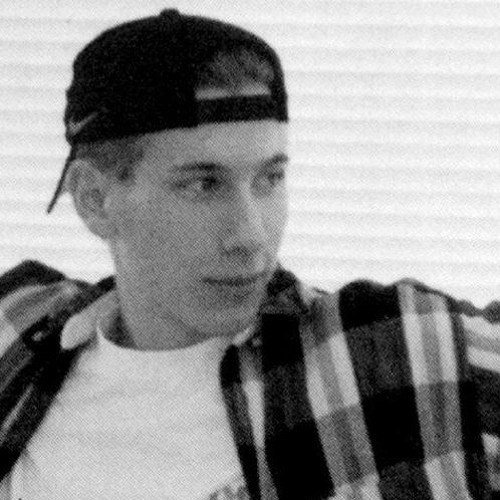
So, what was Eric's "problem?" His behavior is rooted in poor childhood socialization. We know this already. Eric moved around a lot as a child. Throughout his crucial developmental years, the family moved three times: Kindergarten through second grade at 2 schools in Ohio, then to Oscoda, Michigan. In Sixth grade, and a portion of seventh, he was in Plattsburgh, New York. The remainder of his middle school and high school years were completed in Littleton, Colorado.
Eric's high mobility is an explanation for his poor social skills. A study conducted by Robert T. Webb, PhD, Carsten B. Pederson, DrMedSc, and Pearl L.H. Mok, PhD (2017) supports this theory. They conducted research on over 1 million children in Europe and analyzed the psychosocial affects of "moving around a lot" in childhood. This sort of scenario is commonly seen in children of military families; Eric's dad was active-duty Air Force and is the reason they moved so much.
This research found the children who moved around more were at higher risk for: attempted suicide, successful suicide, and deviant behaviors. Violent offending spiked in those who had more mobility in mid to early adolescence. The study reported even higher risk for those who saw multiple moves in the same year, which is something Eric also experienced.

Barker and Berry (2009) found that children of active-duty military caregivers often experienced behavioral issues while their parent was deployed and excessively attached behavior when the parent returned. In a separate study conducted by Flake, Davis, Johnson, and Middleton (2009), children of deployed caregivers exceeded Pediatric Symptom Checklist (PSC) cut-off scores for high risk psychosocial morbidity. Meaning, these children had the highest possible likelihood for behavioral issues rooted in interpersonal starvation. This is a dangerous hot and cold game to play with adolescents that are still learning and understanding the meaning of attachment.
Forming connections and then quickly abandoning them could understandably create an inability to form deep, personal attachments with others. When he did form these connections, perhaps he clutched them a little too closely. These relationships may have been highly volatile if Eric feared he may leave them and lose their connection, just as he had experienced so many times before. The slightest movement may have triggered an aggressive response out of fear.

Eric’s inability to keep and maintain a friend group wasn’t his fault – he did not learn how to properly socialize as a child. Sure, he was friendly and polite, but those are surface-level traits. After breaking the ice, friends of Eric began finding that he was pushy, controlling, and even a bit callous.
While Eric was noted as kind and polite, he was often regarded as shy as well. This shyness may have been influenced by trouble with low self-esteem. In a journal entry dated 11/12/1998, Harris wrote, “Everyone is always making fun of me because of how I look, how fucking weak I am and shit…” (Note: Eric's surgery for pectus excavatum as well as being bow-legged)
We’ve gently and briefly begun the exploration of Eric's childhood and understand the ways in which it could have affected him, behaviorally. The sad truth is, however, there just isn’t more data to help us understand the intricacies of his upbringing. I believe it is incorrect to say he wasn’t met with love by his family.
I do believe, however, this was the case of a child who was gentle, sensitive, and whose personality required fragility and a compassionate parenting style. He was treated a bit more ruthlessly than he was able to withstand by being subjected to an authoritarian parenting style, which we will certainly unpack further in the coming research. I cannot imagine this was on purpose, but I do feel he was forced into being a tough, surface-level person that he was not capable of being. Truly, Eric was probably a very weak person.
IN THE END, ERIC REQUIRED CONTROL IN HIS RELATIONSHIPS. Because of his constant social upheaval, Eric fucking hated not having control. This is a common pattern in attachment styles; avoidant, anxious, ambivalent, etc. We crave control because, for so long, our lives were unpredictable.
Okay, what about his inflated ego? Eric's sense of self was greatly inflated in private, but in public, he was quiet, shy, and relatively unlikeable. He equated himself to a god -- a god of what? He was a master of nothing in real life. Eric's insecurity led him down a path in which he privately lived out his fantasy of being better than those around him.
The most important thing that gets overlooked and nullifies the idea he was a psychopath was the fact that he did feel. Evidenced in his journal:
He expresses that he doesn't want blame to fall on his friends or family. He also writes that he has no self-esteem, he wishes he was accepted more, mourns his relationship with his Dad ("I had a lot of fun at that gun show, I would have loved it if you were there Dad. We would have done some major bonding. Would have been great. Oh well."), he's upset about not having friends ("I hate you people for leaving me out of so many fun things. And no don’t fucking say “well that’s your fault” because it isn’t, you people had my phone #, and I asked and all, but no. no no no don’t let the weird looking Eric KID come along, ooh fucking nooo."), and is self-conscious of how he behaves ("why the fuck can’t
I get any? I mean, I’m nice and considerate and all that shit, but nooooo. I think I try too hard.")
Lastly, the infamous scene from the Basement Tapes in which Eric is crying and says a tearful goodbye to his friends that he wishes he could have said goodbye to. Read more here, page 8.
Eric's journals are filled with anger, hate, and deplorable language. But in my opinion, he does not bear the mark of a psychopath.
TL;DR
Moving around a lot interrupted Eric's ability to socialize in childhood
As a child, Eric was likely sensitive and required a gentle parenting style and was instead met with an authoritarian style that focuses on obedience rather than nurturing
Eric's own words demonstrated his ability to feel emotion, remorse, and self-consciousness.
Eric's "inflated ego" was a show he put on in private because he wasn't accepted by his peers; it was a defense mechanism to protect himself
Overlooking small behavioral patterns in favor of severe conclusions forces us to miss the warning signs after it's too late. It’s hard to hear, but sometimes it doesn’t take that much for people to do horrible things to one another.
255 notes
·
View notes
Text
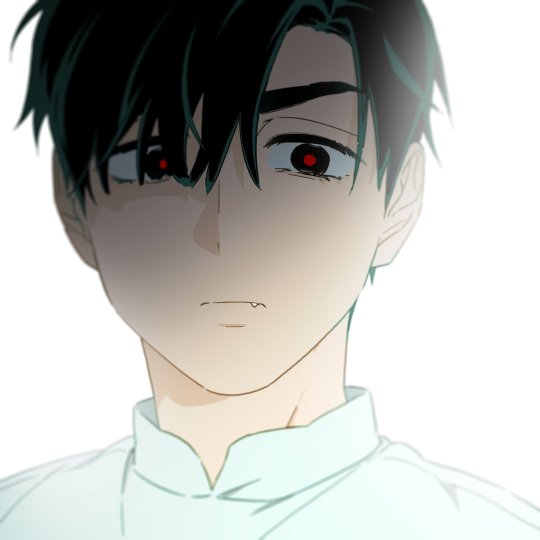
reposting a thread here from twt on my interpretation of ivan and love because why not
ivan so beautiful when you consider his love a proof of self. wym his love for till can be seen as an attempt to abstract value from suffering. wym he calls it shallow in the sense that ivan views it as inherently selfish
ivan being pragmatic by nature and achieving through observation and replication as he cannot naturally "feel" his way through interpersonal relationships and express a true "self". he holds many things in concept "do you like anybody" "i wouldn't know what closeness entails"
i wouldn't say that ivan dislikes sua, only the concept of her. because if someone of the same exact disposition, the same exact variables, manages an irreproducible love then the fault lies in the self: it is an admittance of being fundamentally broken and "different"
that is why he finds superiority over sua when he finds out of her plans of sacrifice: her love is just as selfish as his. it's ok if they're BOTH freaks it's just not ok to be the ONLY freak. i do not think it's an envy of mizi's reciprocation note how he comments on her eyes
and how they had a light that disturbed him. she already found simple joy from the broken environment they were both brought forth from. "I should've been nicer" is just ivan realizing how selfish it is trivialize other people for experiencing and finding joy easier than him
because the difficulty in his happiness vs others does not makes his any more valuable or "genuine". he can view his approach superior and calculated, jaded towards the rest, but at the end of the day he was the sole person who didn't find his peace
NOT entirely true he did find it go go ivan smile smile. but yeah i do not think being raised in a human farm for the giggles of bougie aliens + severe depression helped his case. look at how moe actor au is. so much more lively and expressive, no longer victim of circumstance
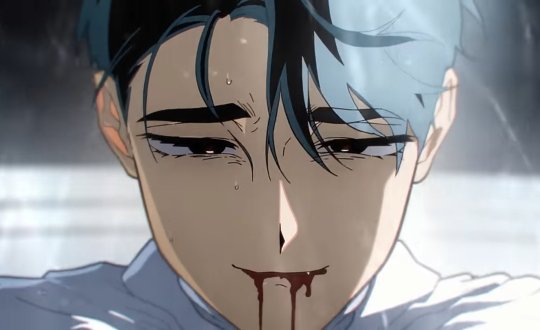
"ivan when the sloppy beast symbolizes his love 🤯🤯 it's monstrous and unsightly yet he cannot maintain his curiosity since its first discovery. at the end of it all he lays peacefully in its maw of the all-loving, he has accepted the lovelessness of it all"
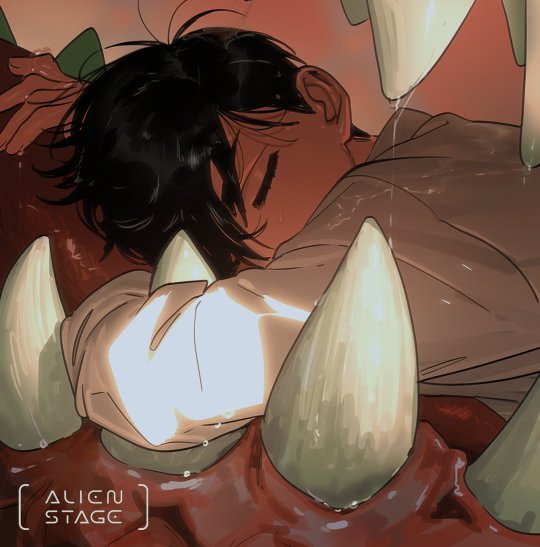
bringing this up again because YES he is sleeping peacefully in a monstrosity of a love he has come to accept. YES this art is actually an expression of self love
at the end of the day he does love till just not in the conventional way he has sought in concept
69 notes
·
View notes
Note
I think I remember you saying you were writing something for autistic adults having trouble meeting people? Actually I just remember the ask you got about someone who found a lot of social spaces being for youths. I have a similar problem. I've lived in the same city my whole life, but I don't have friends here because I don't know how to keep in touch with people after the situation we had in common (school, job) ended. And currently I'm unemployed, so I don't have coworkers, and I'm suffering a lot from the lack of a social context.
There are some kind-of-niche social events I can go to, trans brunch once a month, queer board game nights every friday (and I don't even like board games). But even once I'm there I struggle to reach out and talk to anyone. For the former event, most people go with friends, so I assume I'm imposing if I make more than very brief small talk. For the latter one, we do often end up a group of polite strangers sitting around talking about random stuff, but I find I don't care about the interaction and I just want to go home. I have friends online that I'd rather spend time with, but it also feels so miserable when I don't have anyone to just grab coffee with. I tried tinder briefly, but I can't stand chatting with strangers, I react to it like an obligation and just ghost them. I'm not curious enough about strangers. I don't want to make friends, I want to already have them. It's rough.
The good thing here is you have 100% already articulated what the root of the problem here is: you're not taking an interest in any of the people you're spending time with, and the people you are meeting are not interesting to you.
People like us when they can feel that we like them, care about them, and find them interesting. People want to spend more time with people who make them feel heard, and who have genuine enthusiasm for their existence. The people you're meeting are almost certainly picking up on your lack of curiosity about them, and your sense that spending time with them is some grueling obligation, and so nothing deeper is taking root.
The solution is to have a genuine interest and curiosity for people. If you can't access that, you won't be able to make new friends. Having close friends that you can meet with for coffee at the drop of the hat isn't a status you can simply arrive at, it's a relationship dynamic that you build, painstakingly, interaction by interaction, invite by invite, one open-hearted, presence conversation after another. And you won't now who will become a lifelong, cherished friend to you if you don't start by trying to find what's worthy of cherishing within other people first.
Now, you mentioned that some of the social groups you take part in aren't even all that interesting to you -- and that's certainly part of the issue. If you don't like board games, you're not going to have fun at board game night, you're not going to like talking about board games, and you're going to feel a palpable disconnect between yourself and all the people who are present because they really like board games. You can either try to find something about the activity interesting, and really put your mind to learning about it and taking an active interest in it, for the sake of your own enrichment, or you should stop going, because there's no reason to drag yourself to regular obligation you don't like and aren't putting any investment in.
I would recommend that you find other social gatherings in town that line up more with your interests. Meetups, book clubs, volunteer shifts, video gaming leagues, sports teams, community theater, whatever it might be. This article has more advice about how to find new social groups and to make friends there:
But I'd also encourage you to practice being curious about the great diversity of humanity. There are so many wonderful subcultures out there to learn more about, so many creative and industrious practices to be awed by and to learn about, and so many funny, bizarre people out there worth making a study of. Even if you don't get along with the vast majority of humans or don't want most of them within your close social circle, you should, I think, be able to find something worth learning about in within nearly every human community, and within every person.
I firmly believe that the purpose of life is to grow, experience new things, and learn -- and if you're seeking new friends, you do want your world to be a bit larger than it is, right? So why not try to enjoy learning more about the broader social world? That doesn't mean committing to a regular hobby that bores you to tears (I hate tabletop games, for instance), but it does mean dipping your toe into new waters with some genuine receptiveness to it (I tried tabletop games for the hell of it, learned I didn't playing them, but now I do love hearing about my friends' campaigns).
I wasn't a furry when I first started going to Furfest; I just thought it was interesting and I was awe-struck by the dedication and creativity of people practicing the craft of making fursuits and drawing anthro art. The passion of that community was addictive, and the joy and friendliness of the space opened me up, and within a matter of two convention visits, Midwest Furfest had become one of the absolute social highlights of my entire annual calendar.
I've also gone to a lot of anime conventions, and they didn't grab me quite the same way, but I still sat in on some panels where I learned new things, and I still met people who were lovely and got to take in a bunch of beautiful cosplays. I've tried out all kinds of things, from betting on horse races to performing in sketch comedy troupes to attending naked yoga, and I didn't love or feel good about all of it -- but every single one of those things was worth trying out, because it helped me make contact with a broader spread of the human experience and learn a bit more about myself and other people. it broadened my knowledge base and expanded my social skills -- even if yes, i did absolutely sit in on some conversations that bored me to absolute tears.
If you don't have the energy to be curious about new things and new people at this stage of your life, anon, that is completely fine. When I was in the throes of deep masking and Autistic burnout I didn't always have it in me to make polite small talk or to endure overstimulating new situations. It's difficult to be open when one is traumatized or overwhelmed, and so if you find you really cannot feel anything for any people that you meet right now, working on soothing that internal vigilance and treating that trauma might be the first step. Even trauma recovery requires making contact with other traumatized people, listening to their stories, and being able to recognize yourself within them to some extent, tho.
There are periods of life that are for growth and there are periods that are for dormancy. If you don't have it in you to make new friends right now, that's fine. However, if you do want to have new friends in your life, you do have to be able to like people and care about them.
233 notes
·
View notes
Text
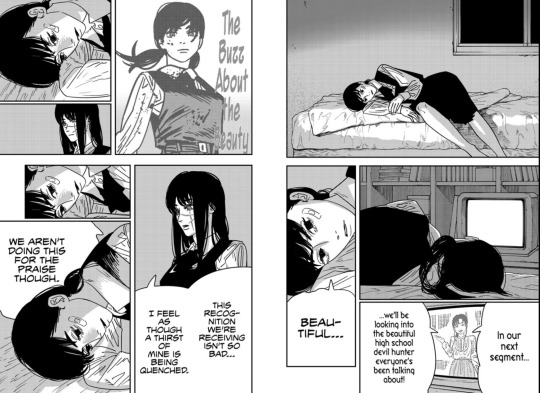
This chapter was very interesting, even if it was mostly set-up. Besides learning the new girl’s name and getting confirmation that she just get kicks from playing with people, the most insightful part was definitely seeing Asa and Yoru’s reaction to the fame.
We see that Asa feels happy over the fame, even if she denies it, and even Yoru admits that it feels soothing, like a need being met, fulfilling. This isn’t surprising at all, after all the whole of Yoru’s goal is to become relevant again, for people to fear her once more, to know of her, and she’s insecure over being called dumb and whatnot: she craves recognition, wants power so she can make people see her wether it be through inspiring awe or inflicting suffering and destruction.
Asa has struggled a lot with feeling like she was invisible, or worse, being seen and getting negative attention, being bullied and judged and seen as dumb, annoying, ugly, boring, useless, someone who always messes up and can’t do anything right, worthless. She is afraid of the spotlight, but we’ve seen that she wants it as well, notably inside the aquarium, in that blissful moment when everyone was cheering her for having her phone. So of course, getting such widespread attention, praise, validation, when she hadn’t even intended for it, when she was just being herself and doing her own thing, it’s like being accepted for once. Being seen, and being loved, not only from a small group like a class but on a wide scale.
Of course, for both of them, such recognition and fame is only a substitute for meaningful human relationships, and it can’t replace those. I think it’s actually very lucky that Asa and Yoru have each other currently, it’s good to be reminded that for how much Asa is alone and isolated currently, she was so even more before Yoru, and Yoru similarly doesn’t seem like she had anyone, rotting away i alleyways losing strength more and more over time. Asa seems to want to keep a cool head over the fame to be self-righteous, but is it more because she wants to keep a collected appearance or because she truly doesn’t want to be sidetracked and be swept away?
Either way, I think it’s interesting that she recenters herself by reminding themselves that she’s doing it for Chainsaw Man. In a way, her goal then is something like a human relationship like I mentioned. Not that I think she thinks she’d get to get closer to Chainsaw Man or something, but that she’s motivated by something akin to selflessness, for someone that means a lot to her. A lot to Yoru too.
Yoru sees Chainsaw Man as the one who took away her recognition, who stole her thunder, by eating atomic bombs out of existence, meanwhile Asa sees Chainsaw Man as one of the first people who saw her, who talked to her at her lowest and looked at her at her filthiest, and decided that she was worth something, worth protecting. I’m getting sidetracked here but ough!! Let’s just hope Asa doesn’t lose sight of that interpersonal relationship that he inspired her to pursue, gave her the courage to do so, because of easy and fickle validation from fame, is what I’m trying to say.
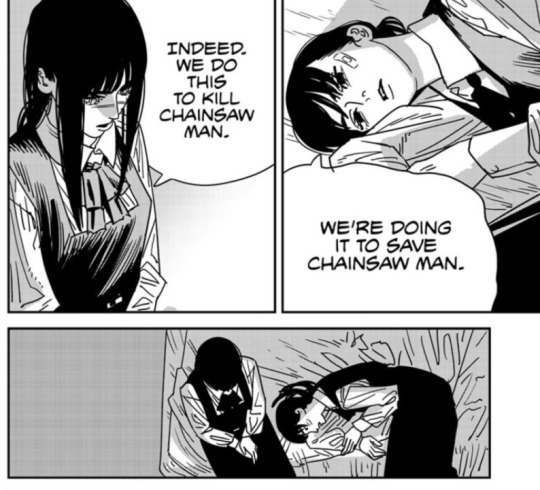
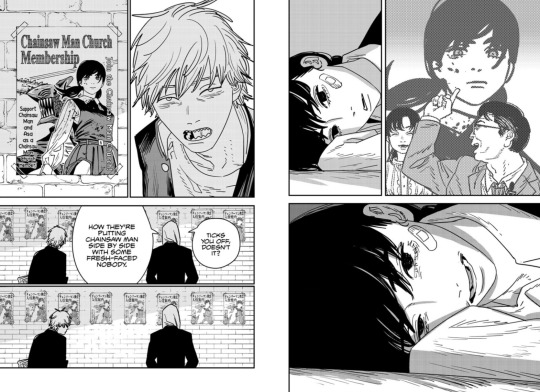
On Denji’s end, things seem to keep getting worse, even as they… Kinda get better? It turns out the woman is an ally and not an enemy, but Denji seems disappointed by their fight being discontinued, losing the rush he’s so acquainted to. He can’t be Chainsaw Man anymore, right, but he could still fight as Denji, except… It’s not necessary, he’s protected and people have it covered. He loses a possible love interest and enemy as she turns out to be something more like a colleague if anything, their relationship becoming professional and distant by nature, himself making a comment about that. She says that she likes/admires him because he’s Chainsaw Man and Denji is stunned, is it because that attention is a crumb of recognition, recognition that he used to be center stage for all the time just not long ago? Or is it because he’s "Chainsaw Man" in her eyes, because even as she speaks to him the crumbs of validation are directed at Chainsaw Man and not Denji, because he lost the opportunity to have a genuine connection as himself. Fame gives and even as it does, it takes away.
It’s very possible that Denji feels jealous of Asa in the posters scene. Not only does she get to fight devils and do what he’s not allowed to do anymore, but she also gets to do it with her name and her face public. While he was told times and times again that he couldn’t have his identity be public for his safety, Asa gets to do it freely wothout repercussion (thus far), she gets to be liked as herself.
But moreso, I feel like the scene’s about loss. With Asa rising up in fame, Denji will have to keep hearing about her and her exploits, not only as a reminder of not being able to be Chainsaw Man anymore but also a reminder of the girl he liked that he had to dump. He couldn’t keep Chainsaw Man, and he couldn’t keep Asa either.
Things have possibly never been more normal for Denji’s daily life, and yet it is utterly miserable.
#Chainsaw man#csm manga spoilers#csm chapter 138#Asa mitaka#yoru#Quick chapter analysis#Idk if i’ve said anything that hasn’t been yet tbh#Character analysis#Denji#he’s here too ig#Fumi rambles
170 notes
·
View notes
Note
I would love if you got started on the Benjamin Franklin effect, please fill me in
Oh dear how did I miss this lil prod from days ago to ramble on about something I mentioned in my tags?! I never miss a chance to ramble! No time like the present I suppose.
As anyone who’s followed me too long will well know, I love a cognitive bias or lil human psychology fun fact. This is yet another one I’ve collected over the years. In its shortest form, the Benjamin Franklin Effect is a cognitive bias that “causes people to like someone more after they do that person a favor, especially if they previously disliked that person or felt neutral toward them.”
I’m sure the science behind it is dense but I’m fairly unfamiliar with all that 😂 For me, this is just one of those interpersonal skills I strategically deploy when needed in life and work. As a nonprofit fundraiser/someone who works in philanthropy, I’m constantly asking very “important” or “fancy” people for large sums of money and before said large sums can be asked for (to employ 20 people in feminist work in Texas year round) you usually have to build a positive and trusting relationship. It’s extremely useful to be able to fast track that process, so I ask for the favor of getting a chance to “pick their brains” about something they have expertise in or I ask them to speak at an event, etc. It’s effective!
But this tool has usefulness in SO MANY ways beyond work, too. And if you know about it, you can even be aware when someone is using it on you. The very person who taught me about it…let’s call her Becky, years later, used it on me. Becky and I had experienced a falling out and she had reached out and apologized. We eventually met up to catch up over coffee and the next thing I knew, I had agreed to help give advice to her friend who is also a nonprofit fundraiser. Becky’s friend had a work conundrum and she needed to troubleshoot it with someone like me and there I was agreeing to do Becky a favor and I couldn’t resist being like “I know what you’re doing bitch and it IS working” 😂
As someone who is not naturally the most adept at navigating social situations but who made creating positive relationships w/ other human beings a lifelong special interest approx 30 years ago, it’s so helpful for me. I just keep on collecting ways that you can tangibly build rapport with others to have ready in my back pocket and I can say with certainty this is an effective one when used well.
Clearly I’m not saying to be a manipulative, calculating asshole in life, but understanding how to utilize tools like these can be a huge help when/if you need them.
Anyway, use wisely and enjoy 😘
#Benjamin Franklin effect#cognitive bias#resources#healthy relationships#positive relationships#career stuff
84 notes
·
View notes
Text
Sorry I keep posting about this but I really can't get over how there was a missed opportunity in not giving Gortash and Wyll more of an interpersonal relationship. We know Ulder didn't have a very high opinion of him but I do think depending on how Gortash was playing his cards his ideas might've held some initial intrigue for a younger version of Wyll Ravengard. Gortash has a tendency to position himself as a man of the people, reinvested in the safety of every day Baldurians. There's a way where he could even posture himself as an alternative to the Flaming Fist and their (mostly deserved) reputation for only protecting the patriars. I think at a glance that idea would catch Wyll's interest, considering his start as the Blade of Frontiers was largely about protecting those who no one else bothered to protect.
There's also Gortash's status as an outsider, something that I think would directly connect him to Ulder in Wyll's mind. Two men born outside the nobility, who unlike most of the politicians they work alongside had to work for every drop of status they got. Wyll left Baldur's Gate before Gortash's political career took off properly and he was allowed to be a little more open about his explicitly fascist politics. I think giving him some lingering fondness/reflexive defensiveness of Gortash could've made for some extremely interesting Act 2 and 3 conflict with him and Karlach. I don't think he'd be extremely defensive about it to her face, he'd be of course horrified what was done to her. But imagine him privately confiding in the player that he knows how easy it is to get in over one's head with devils. Is it not just as possible that he made a deal, like Wyll, with the best of intentions and, like Wyll, that deal had devastating consequences? It may be too early yet to cast judgement when he's not around to defend himself.
And then. You know. You find his dad under Moonrise and it becomes pretty clear.
I think it could really be another avenue through which to examine Wyll's personal connection to the city, especially the city's nobility. By Act 3 he is of course fully with Karlach on the stomp this fucker train. But there's a new weight now to the interactions with Gortash where he's present. Gortash is at first full politician trying to win him over. Wyll, you know how difficult your father can be, I don't WANT to tadpole him but you've seen for yourself how easily he can tunnel vision on his views of right and wrong. Baldur's Gate faces unprecedented problems, is it so unlikely that we need unprecedented solutions? Depending on player choices I can even see him leveraging his history with devils (and escaping them) to offer Wyll some alternative means to get out of his contract. Perhaps even reverse or cover up what Mizora's done to him appearance wise. The chance to be welcomed back into Baldur's Gate as its pride and joy, fully human, with a father finally happy to embrace you and a city in desperate need of heroes. All you have to do is swallow down the fact that it'll be premised on a lie.
I think it'd be a good way to bring forward the conflict of Wyll's act one personal quest, both by reiterating the conflict between Wyll and Karlach. And also by doubling down on the question that quests introduce. What will win out: your fear of the devil and your desire to buy into your own image as slayer of dragons killer of demons (and the heartless)? Or your own innate goodness and desire to do the right thing, even at extremely high costs?
#i always feel weird trying to write wyll as corruptible#understand the most corruptible thing about wyll is he genuinely wants to trust other people#even people who dont deserve that trust#anyways in my dream where you give wyll the chance to decide for himself#he does just deck gortash#wyll ravengard#enver gortash#bg3#baldurs gate 3
135 notes
·
View notes
Text
Crowley's BPD Traits And Why They Are Important;
We all know our beloved ineffable husbands are neurodivergent icons. Despite not being human they both act like neurodivergent humans would (and do).
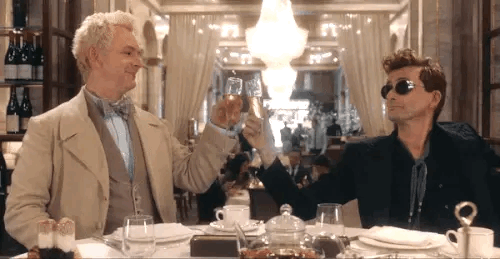
Today I thought we would take a look specifically at Crowley and his BPD traits and what they mean.
(Also before we start; a trigger warning for talks and mentions of suicide, depression, mood swings, drinking, and trauma).
First what is BPD? BPD stands for Borderline Personality Disorder.
"A mental disorder characterized by unstable moods, behavior, and relationships." -Mayo Clinic
BPD is a disorder caused by trauma. Trauma is of course different for every individual. So while some demons may seem perfectly content with the fall from Heaven, others may have been significantly traumatized. And I believe this is where Crowley falls (pun very intended).
So we covered how Crowley could have developed BPD, but let's talk about their traits.
The DSM-5 lists 9 Criteria for BPD, of which at least 5 are required for diagnosis. We will be covering each one and how (or how they don't) apply to Crowley.
1. Frantic efforts to avoid real or imagined abandonment:
As we know BPD is caused by trauma, but more specifically it can be trauma that deals with abandonment. Say God casting you down to Hell for simply asking questions?
This can lead to the person with BPD going through frantic efforts to avoid abandonment happening ever again.
We can see this most in Crowley when she argues with Aziraphale. Can you count how many times Crowley tries to run away with Aziraphale so that he doesn't leave him during an argument? It's three. They have done this three times (and that's just the on screen ones, who knows whats happened in 6,000 years!).

2. A pattern of unstable and intense interpersonal relationships characterized by alternating between extremes of idealization and devaluation.
Now this one is harder to see in Crowley because this trait of BPD (and many others) comes out most in romantic partners. And Crowley has only ever had one apple in his eye, Aziraphale. But even just with their relationship with Aziraphale we can see this.
While Crowley never directs his anger at Aziraphale we can definitely see how much the angel affects him. Their arguments that can lead to them not talking for decades, Crowley literally exploding with lighting because of his anger.

An example I find most interesting is Crowley's entire perception of Aziraphale changing when he sees Aziraphale let the people in the flood die. And this perception is only fixed in the Job minisode when Aziraphale does the right thing again. All it takes is one incident for Crowley to change her mind.
3. Identity disturbance: markedly and persistently unstable self-image or sense of self.
I think this is most obvious in the opening to season 2 where Crowley is questioning the meaning of life and more importantly his role as a demon.
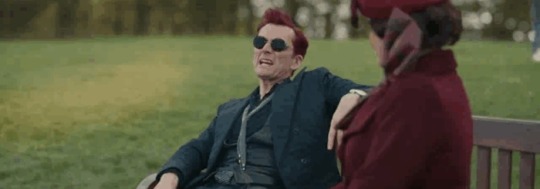
But this isn't the only demon related identity disturbance Crowley faces. A common identity disturbance for those with BPD is believing that they are evil. This is caused by trauma but is also not helped by the stigma Cluster B disorders face.
Crowley believes he must be evil because he is a demon. He lies because he is a demon. Just like someone with BPD may believe they are evil for their disorder or are manipulative because of it. But in reality that may not be the whole truth. You can still be a good person despite being a demon, despite having a disorder.
4. Impulsivity in at least 2 areas that are potentially self-damaging (e.g., spending, sex, substance abuse, reckless driving, binge eating).
Do... Do I need to explain this one?
Crowley is an alcoholic. He casually drinks but will also drink anytime a slight inconvenience pops up.
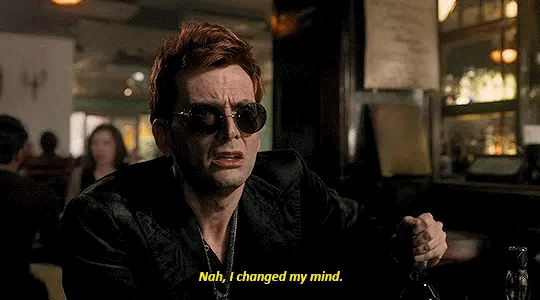
Crowley is also known for going "too fast". He is almost always speeding in the Bentley.
5. Recurrent suicidal behaviour, gestures or threats, or self-mutilating behaviour.
This is one of the ones that is harder to apply to Crowley simply because she is a demon, not a human. It is much harder for him to kill himself. And while this trait must be recurrent I still think it's important to bring up the Holy Water incident.
Crowley tells Aziraphale the holy water is just for insurance, but Aziraphale knows Crowley better than that and was right to assume it could probably be for a suicide pill. (Even if it did come in handy as insurance later). But the fact Aziraphale assumes that I believe is telling.
6. Affective instability due to a marked reactivity of mood (e.g., intense episodic dysphoria, irritability or anxiety usually lasting a few hours and only rarely more than a few days).
We see a few different times where Crowley's mood shifts into extremes.
We already discussed the lighting incident. I think another big show of their anger is how he treats his plants in season 1. While yes it is them recreating their trauma with God (Metatron?) and being thrown out of Heaven, that anger comes from somewhere.

Jim short for James, long for Gabriel also sparks this anger in Crowley to the point of threatening his life and telling him to jump out of a window.
Crowley's depression is seen on the biggest spotlight when talking about the fall. Their sentiments about not meaning to fall, that she only ever asked questions.

7. Chronic feelings of emptiness.
Unfortunately I can't speak on this one purely because I do not live in Crowley's head. I do not recall it ever being something mentioned or showed. That doesn't mean it can't happen to her of course, but let's stick with the facts.
8. Inappropriate, intense anger or difficulty controlling anger (e.g., frequent displays of temper, constant anger, recurrent physical fights).
As you can see BPD deals with anger a lot. so I will once again bring up some points we've already made. With the lighting incident, and good old Jimmy-boy.
I also just wanted to mention we know Crowley appears a bit angry at most times as well as Muriel describes him as "the grumpy one". Just thought it was a fun, helpful detail.
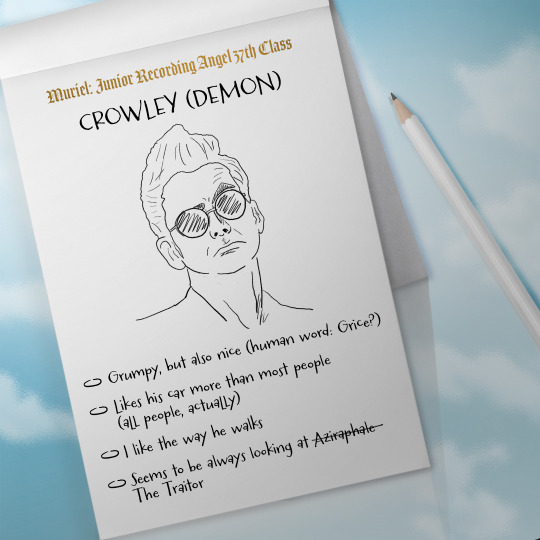
9. Transient, stress-related paranoid ideation or severe dissociative symptoms.
This one is also a bit hard because again I am not in Crowley's head but also she does in fact have plenty to worry about that is real.
But Crowley does still show paranoid ideation. His distrust of others, disorganized thoughts (talking about ducks and the end of the world at the same time), feeling threatened, thinking he's being spied on (the ducks have ears).
Lots of ducks.
Now some may think diagnosing/headcanoning a character with specific mental illnesses is silly, and maybe it is! But I still believe it's important. Why?
Well for starters; representation is always important. Seeing someone similar to you on screen you can relate to and find joy and comfort in. Or maybe they're just raising awareness. Or just showing that hey, these people exist.
But I also wanted to touch on the stigma of BPD and other Cluster B disorders.
I touched on it briefly in an earlier point but BPD is heavily stigmatized. Many people treat the disorder as evil and manipulative. That the people with it don't deserve love or kindness. Which is of course simply not true.
Most of the characters coded with BPD today are antagonists and/or villains. Think Jinx from Arcane or Spinel from Steven Universe. These characters are amazingly written and performed and I do love them dearly. And there is nothing wrong with them, but it is nice to even the playing field. To have a character with traits of BPD who is fundamentally good and does the right thing. They are a protagonist of their story and even a hero!
And that is why I think Crowley is good representation of BPD (even if it was not intended that way).
And here's hoping to season 3 so our demon (and angel) get a happy ending!

#Anthony J Crowley#Crowley#Good Omens#Good Omens 2#Gomens#Ineffable Husbands#Aziracrow#BPD#Borderline Personality Disorder#Neurodivergent
131 notes
·
View notes
Text

it’s hard to consider the possibility that some of your dysphoria might have been “created” as a result of like, pre existing aspects of your psychology/trauma and engaging with what are probably (somewhat to very) misguided groups of people/ideology, but honestly, it doesn’t mean you’re stupid or fake. humans are social animals, we are very responsive to our communities. their words, actions, and ideas create realities in our lives.
it took me a long time to consider the possibility that my dysphoria wasn’t innate, and even longer to acknowledge it publicly. but now i know it isn’t something to be embarrassed of. it’s very very understandable. misogyny sucks, dysphoria sucks, figuring out how to cope with dysphoria in a misogynistic, homophobic, and transphobic world sucks.
generalizing my experience to others whose dysphoria escalated a lot as they engaged with trans ideology and community, i believe there’s a lot of potential for significantly improving that dysphoria through engaging with healthier communities and ideology
you have to use a lot of critical thinking, and you have to be selective about who you choose to engage with, open up to, and surround yourself with. this can be really, really hard to do, especially if you have a history of interpersonal trauma. working on developing self empathy and identifying the patterns of damaging relationships that you’ve had in the past is essential to being able to avoid being retraumatized as much as possible.
if there is a space you’re wishing for, chances are others are also longing for that. try to create it on the scale that’s available to you. even if that’s just person to person and friend to friend. you can build something better.
from max robinson | thinking of detransition? you are not alone
#detransition#detrans#ftmtf#detrans ftm#detrans female#ftm detransition#ftm detrans#trauma#actuallydetrans#actually detrans
38 notes
·
View notes
Text
Mu’s understanding of relationships
Analysis dump, this time specifically about Mu’s view of relationships. I don’t think she has any idea what a normal relationship is or understands how social attachment works for most people. For her, everything is transactional, and she assumes it works like that for everyone. A friendship is giving and taking and nothing more.
As far as we know, Mu has never had a true friend. She’s had “friends”, but it was never an actual bond. Before the bullying of Mu started, her friends still hung around Mu for a material benefit. We can see them fawning over her wealth and being offered expensive lipstick from Mu, along with the protection of the queen bee of the school. In return, Mu gets people to provide her “honey”, as well as people who will do what she says.
Mu consistently refers to these people as her friends, or at least former friends, despite the fact it doesn’t seem like either of them actually liked hanging out together. It was mutually beneficial, but not born of an actual connection. Mu defines friends simply as “Someone who properly listens to what I say.”
When one of the bug girls stops providing honey, Mu pushes them over. They’ve stopped fulfilling their end of the bargain. If her friends don’t give her something, then they’re not friends. As far as Mu knows, everyone else operates the same way, and she’s not entirely wrong. Her friends do abandon and turn on her when she stops benefitting them. She doesn’t understand selfless loyalty because she’s never experienced it.
Still, I do believe she cared about Rei. She sings the lines “I love you” while chasing after her, reaches out to her, and clearly is very affected over her rejection above everyone else involved in the bullying. Mu’s murder was an impulsive move in a fit of emotion, and I doubt she would have felt so strongly over someone she didn’t care about. She just didn’t know how to deal it.
Mu comes from a pampered background and probably never had any interpersonal conflicts like this before, let alone one as extreme as the bullying she went through. Nobody ever taught her how to properly deal with things like this. All Mu knows how to do it to be the queen bee and whine when things don’t go her way until they do. Her whole life she’s been in control, so when she looses that control and can’t wrestle it back no matter how much she cries and begs, she panics.
In the first voice drama, Mu tries to get Es to like her so she’ll be seen as innocent. She says “All I have to do is gain your favour, right? I’ll listen to what you say! So, what would you like me to do?”, calling back to her saying that a friend is someone who listens to what you have to say. She instinctively starts trying to make herself likeable and worthwhile to hang around to gain something (in this case, an innocent vote).
Despite this, moments after, she shows genuine concern for Es (she also worries for Es’ health in the second voice drama), asking about their odd behavior and speech without any obvious gain to her, then panics when they start freaking out. When Es snaps at her for it, she grows defensive - it seems every time she’s tried to be genuine to the people around her, it’s gone poorly for her.
Once Es calms down, she falls back on her standard view of relationships. Mu flat out says “So, in other words, I should just become someone you’re fond of. And, if I do that, you’ll forgive me, right?” and “Prison guard, you’re human as well, so… I’ll do my best. I’ll figure out what kinda person you’re fond of.”
She’s not wrong, either. She was forgiven in After Pain for showing her more pathetic, pitiable and weak side, but now that she’s become more abrasive she’s getting largely guilty vote. She’s getting punished for her personality rather than being what people want to see once again.
In the second voice drama, she becomes less desperate for Es’ approval because she doesn’t think she needs it anyone. She doesn’t have to be likable anymore because she doesn’t need something from the person she’s trying to endear herself too. “I know now that I can get whatever I want if I ask for it, so I don’t need to be so on edge anymore.”
Her relationship with Haruka operates the same way. They both provide each other what they crave - attention and validation for both, a mother figure for Haruka, and someone to always listen to her for Mu. Because of that, they’re friends. There doesn’t need to be anything more. If two people have something to gain by being friends, what more is there to it?
When Es questions her, directly asking if she wants something from Haruka, she asks if Es has any friends. When they say no, there’s this conversation, which I find really confirms Mu’s unhealthy view of relationships.
“Friends aren’t like that, you know. Rather than using each other for something, we just get along because we’re comfortable around each other. That’s all.” “Haruka-kun is really nice! He accepts anything I say, he listens to anything I tell him. For me, that’s really comfortable.”
“And that’s...friendship?”
“What do you mean? Of course we’re friends! Haruka-kun is happy with it, so it only has benefits for both of us!”
“...isn’t that just exploitation?”
“Exploitation…? Um, I don’t really understand, but… I do help him pick out clothes in return, and I recently gave him a hairpin I didn’t need anymore as a hand-me-down!” “I don’t think it’s a relationship that anyone could have a problem with!”
To Mu, her relationship to Haruka is perfectly normal. She’s confused when Es questions it, and insists this is just how friendship is. She says nothing about how they feel about each other, only the ways they benefit each other and that they’re both happy with those benefits. There’s nothing about Haruka as a person, only what he can provide her, and Mu talks about herself the same way. She only points to her giving Haruka material gifts, direct favors and that he’s happy with what he gets rather than them actually liking each other. It’s not important to how Mu thinks of a friendship.
Mu knows about Haruka’s suicide threats, and seems excited about it. To her, it’s a show of devotion, that he won’t turn on her so easily. If he’s willing to give her something like that, then they’re really friends. I don’t think she want Haruka to die by any means, but rather that she doesn’t understand how a normal person would respond to something like this. It’s Haruka’s choice, right, so what does it have to do with her?
“That made me happy… It made me really feel our friendship!”
“You know about it and you’re not trying to stop him?”
“Why would I? Haruka-kun says he wants to do it, so there’s nothing I can do, right?”
“But you’re calling him your friend.”
“Isn’t it exactly because he’s my friend? Isn’t friendship about letting your friends do the things they want? … Are you about to tell me “that’s not what friendship is”? Then what is friendship? You’re together because it’s beneficial for everyone involved, aren’t you?”
She directly says she thinks friendship is because it’s beneficial. That’s her understanding of friendship. To her, Haruka’s suicidal behaviors are his own personal choice and you’re not supposed to interfere with what your friend wants to do.
I think part of this comes from her own suicidal thoughts in the past. When Mu was at her breaking point, desperate and about to seriously hurt herself to try and escape the bullying, she reached out to Rei. She grabbed onto her, pleading and crying for help, only to get brushed off. Nobody helped Mu when she felt this way, so she has no reference for what help would look like.
TL;DR: Mu’s never had a friendship without exploitation and unhealthy dynamics but doesn’t understand this isn’t how it is for everyone, leading to some of her worse behaviors because of this skewed worldview from her past experiences
#illia original#mu kusunoki#muu kusunoki#kusunoki mu#kusunoki muu#milgram#milgram project#analysis#meta
214 notes
·
View notes